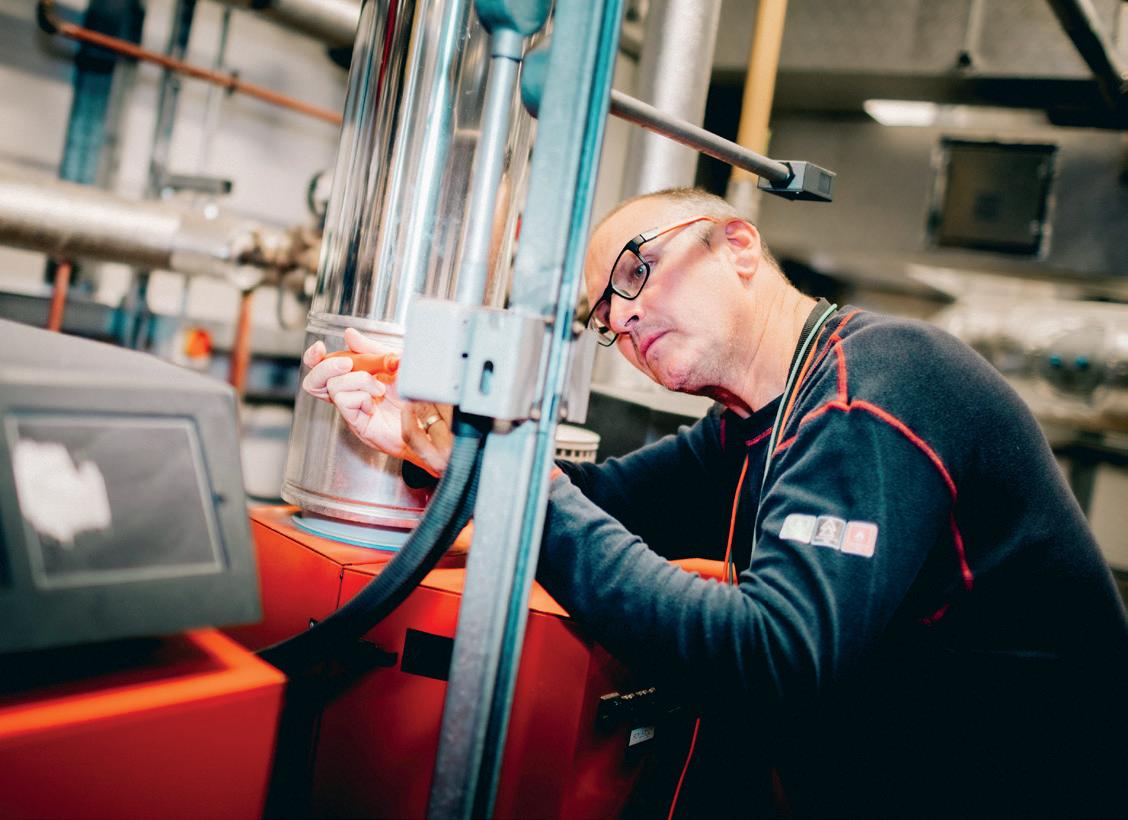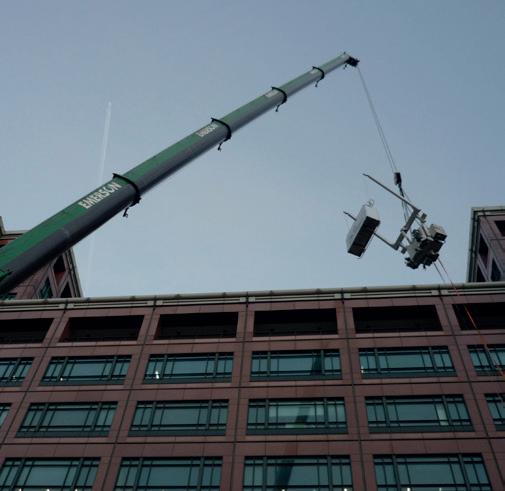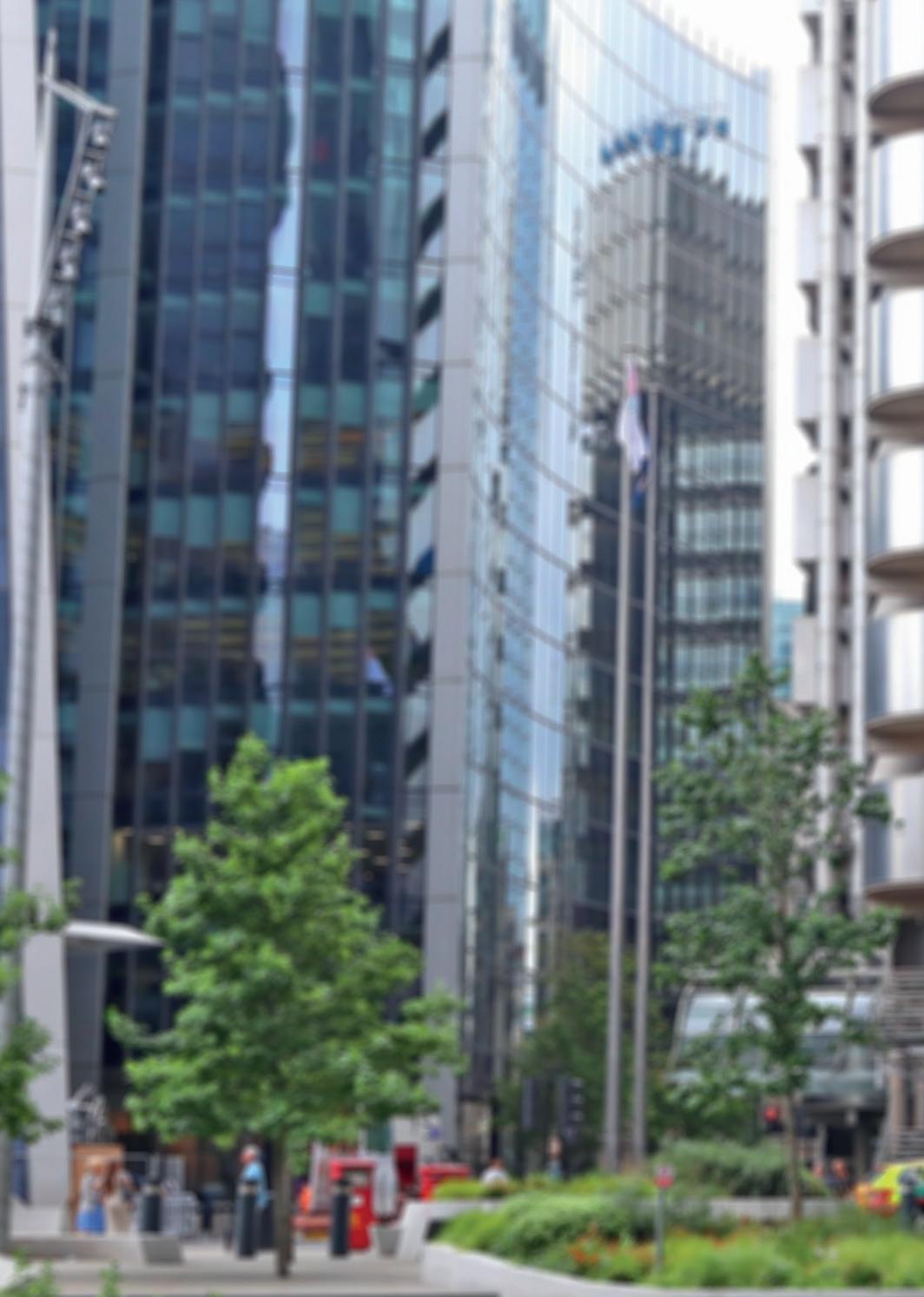
















High levels of inflation and increasing energy bills are possibly the two main issues impacting individuals, while businesses are equally affected and also having to deal with Brexit, the impact of Covid, supply chain issues and staff shortages, etc.
I’ve always been impressed by those who face the various challenges seen in personal and professional lives and are still able to see positive developments emerge from them and am very pleased to report that this issue of FM Director provides a number of examples.

The majority of readers will no doubt be aware of the Real Living Wage and the foundation’s programme manager Sebastian Bachelier provides an excellent example of the benefits of adopting a positive approach (turn to page 60 of this issue). His statement regarding the significant increase in accredited companies that have signed up to the Real Living Wage since the pandemic shows that every cloud has a silver lining.
One of the foundation’s aims is to increase the number of FM companies signing up to its Recognised Service Providers accreditation. With significant growth already recorded by the foundation over the last two years, this shows an increasing level of recognition for the need to support employees.

This message can also be seen in other areas of our industry, particularly within the changing view of FM services, many of which are now regarded as an investment and business enabler rather than just another cost, which is another beneficial effect of the pandemic and our industry’s rapid and highly effective response to assisting clients and their businesses to deal with the impacts.
There are many more positive aspects existing and emerging throughout our industry and it’s certainly another highly enjoyable part of my job to report on these. Education is always the key to changing perceptions and that can only be achieved on a collaborative basis, either in official learning exercises or interaction with industry peers.
Having launched our website, marketing support, daily newsletters, FM Director magazine and the FM Recruiter service this year, the next major development will be the introduction of our FM Community initiative in 2023. This will see senior industry personnel enjoying networking and interaction and allow everyone to increase their knowledge and understanding of our industry’s potential to deliver positive outcomes. It could even, in the words of Cloudfm CEO Jeff Dewing (turn to page 6), help them to change
Anyone who is not aware of the long list of challenges currently facing companies and individuals throughout the UK must be living either a charmed life or as a hermit with no access to society
next major development will be the introduction of our FM Community initiative in
FLOWER MANAGING EDITOR
11
Jeff Dewing believes there is an urgent need for concentrating on environmental policies that will assist with the meeting of all requirements within ESG
Industry experts provide their thoughts on how cleaning companies have adjusted their operations to become more environmentally friendly and reduce their impact on the environment
Adam Carrison explains his company’s development, plans for the future and the value of its skilled and loyal workforce
Lynn Webster continues to enjoy her 40-year career that has covered every imaginable area of cleaning and hygiene

Offering adaptable and modern office space in central Reading, The Blade combines this with a strong focus on sustainable FM operations in all areas
Combining YorPower and PPSPower into a single business will provide the platform to generate more growth while supporting clients and employees alike
The need for collaboration in all areas of FM service delivery to ensure effective completion of relocation projects is confirmed by Richard Lear
FM Director approached a selection of industry experts to ask for their views on how CAFM systems will continue to develop and assist in the running of facilities and estates
33
Given today’s fast-changing environments where catering service and maintenance is provided, service level agreements (SLAs) between customers and third-party service providers can often drive the wrong outcomes.
James Massey has enjoyed a long career in the software and digital solutions supply side of the FM industry and shares his thoughts on this and how the industry can benefit in the future
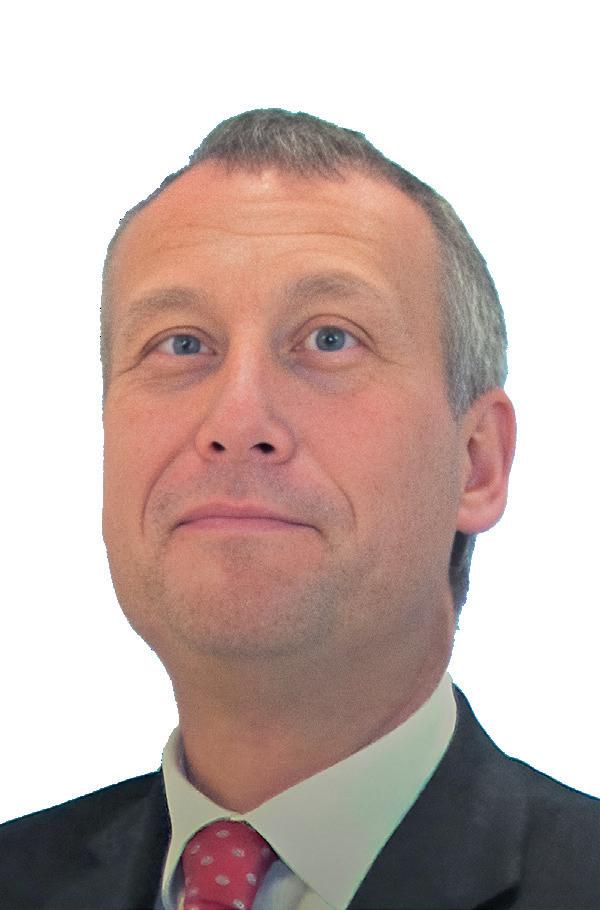
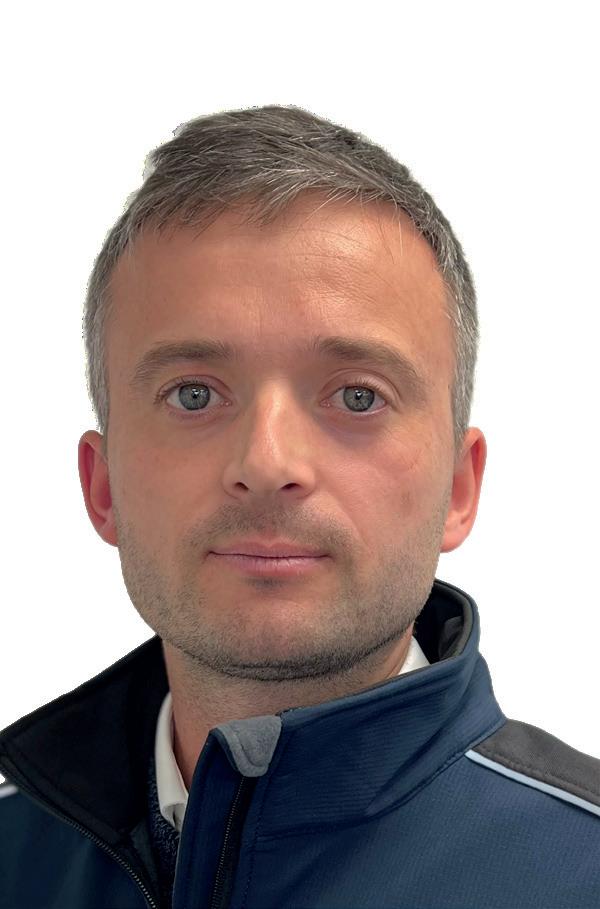
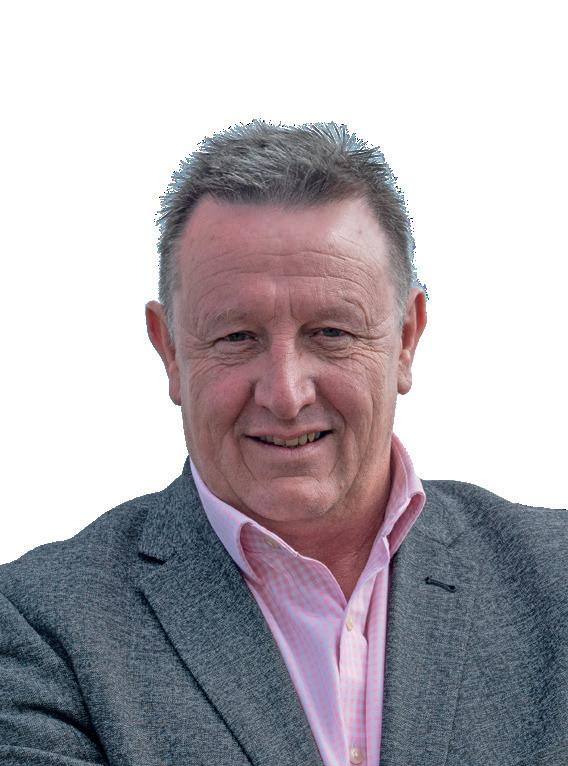

Jeff Dewing believes there is an urgent need for concentrating on environmental policies that will assist with the meeting of all requirements within ESG

ne of the many recent topics of importance emerging from the FM industry is that of environmental and social governance (ESG). FM Director spoke to Cloudfm group chief executive officer Jeff Dewing on this topic and many others as he was preparing for his company’s Supply Chain Partner Forum in London earlier this month.
Although the ESG topic is not new to the FM sector, it has noticeably increased in importance, and this has seen a growing number of companies and individuals acknowledging its influence.

Mr Dewing founded his company in 2011 to fix a facilities management industry that was fundamentally broken, and he continues to state that there is an urgent need to restore the element of trust.
“Cloudfm has always striven to be decades ahead in doing things differently – we recognise that you want to be able to manage your building portfolio in a cost-effective, compliant and quality-led way. Transparency and technology are our thing,” he continues. “Our in-house developed technology underpins the best people and the most efficient processes – there are no gaps in information, no manipulated data and only the best relationships
“You can see lots of focus and effort to meet or deliver governance processes, and it’s the same with social requirements within ESG, and that is including all CSR aims and projects. But there needs to be a major push to focus on the environment side,” he says. “If this is delivered in enough depth and focus, all the other aspects of ESG will be included and met, but there’s a lot of work to do for some companies to get there.”
Further proof of the importance of all aspects of ESG has been provided by the appointment of Katrina Christopoulos as the head of ESG at Cloudfm to drive the company’s success rate of meeting its long list of objectives. “The company was founded on the basis of how to enrich other people’s lives, and ESG is another way of confirming that this has been the correct approach,” says Mr Dewing.
“We’ve always focused entirely on providing hard services to all our clients and have never looked to get involved with soft services, but it’s important that we remove any barriers that may stop us from doing the best we can for all the buildings we look after, and make them as efficient as possible. That means we need to work with everyone in the supply chain, which is something a lot of people have told us was impossible in previous years,” he continues.
“But we’ve now found a way to engage with

Cloudfm has always striven to be decades ahead in doing things differently
When agreeing on the areas that need to be addressed, it is important for businesses to avoid what Mr Dewing describes as “all the corporate fluff”. This can include any claims that are made without data and facts that support them and show their benefits.
He further explains that the motivation to engage with and deliver ESG ambitions must be a central element within all businesses and their workforces, which will help to avoid the issue of waning interest levels. “We’ve seen this in the past with many schemes, particularly in large companies, when they launch initiatives to save electricity, for example, with everyone supporting these in the first few weeks.
“But then a few key personnel will leave, and others will gradually lose interest, particularly if there are no results being seen to show the savings achieved. It might be that the electricity bill doesn’t arrive for several months and by that time the majority of people will have forgotten all about it.”
One of the most important aspects to attend to is the removal of anything that will prevent or restrict any actions necessary to achieve the company’s desired outcome. Mr Dewing believes that the last few years have been characterised by a growing need to introduce fundamental changes to the running of businesses.


“We’ve always focused on how to change the FM industry and restore trust since we launched our company,” he continues. “In many ways, we were 20 years ahead of the rest of the industry, but the response to our business model shows we got it right.”
Providing further explanation of the reason for major changes within the FM industry, he states that planned preventative maintenance (PPM) has been the standard approach to keep plant and equipment operating and avoid breakdowns, but this has not worked.
“A lot of companies have been paid a lot of money, but the end result is that clients have still suffered breakdowns and inconvenience. And then, they have to resort to reactive maintenance to fix the issues, and service level agreements are another problem within this.
“We’ve had the wrong focus in the FM industry, and there have been too many broken promises when companies are unable to deliver. Everyone’s talking about the shortage of skilled workers and the need to train more people, but they’ve been saying that for years, and we’re still nowhere closer to filling all the gaps.”
One of the most effective solutions to the issues outlined above is the application of technology, says Mr Dewing. When a technological resource is applied correctly, it will provide more time for the best solutions to be planned and implemented, eliminating the need for service level agreements (SLAs).
Everyone’s talking about the shortage of skilled workers and the need to train more people
Another issue that needs to be addressed is that of highly skilled engineers who are frequently tasked with attending sites where breakdowns have occurred, only to find that the fault is due to something simple, such as a dirty sensor that merely requires cleaning. These tasks can easily be completed by staff members with less formal training if the nature of the fault is identified in advance. The maintenance company can then send an engineer who does not have a complete set of technical skills but who is capable of fixing a minor fault to save the client from having to wait for a colleague to become available.
“We had already started to work with Essex University before Covid hit, but we made the decision to invest heavily in developing technical solutions to solve some of the problems we’ve been seeing when the first lockdown shut many facilities down,” says Mr Dewing. “This allowed our 20 developers and six PhDs to really push the boundaries.”
The company had invested in a knowledge transfer partnership (KTP) which partners businesses with the necessary expertise to achieve their goals. This resulted in the six PhD graduates joining the payroll of the business and working with its team of developers, resulting in the creation and industry testing of the Mindsett software program.
“We’re in the third year of the KTP scheme, which helps PhD graduates receive industry experience and
decide where they’d like to work. None of our people has left, and they all love the freedom they’ve been given to solve problems.
“Having developed the Mindsett solution, we’ve now had more opportunity to test this and adjust it to make it even more effective.”

He further explains that the system centres on the PRISM Smartbox, which is connected to the electrical distribution board of the premises it is monitoring. Its name is derived from the effect that a prism has when a beam of light passes through it and is divided into all the colours of the spectrum.
“The PRISM Smartbox will identify all the assets drawing power from the electrical supply and label each item. In addition to measuring the consumption and performance of each piece of equipment, it also measures its harmonics,” says Mr Dewing.
“Each appliance has its own set of harmonics, or fingerprint and the Mindsett system will monitor the performance of each one, allowing it to predict in advance when a failure will occur.”
He emphasises that the system does not rely on sensors being fitted to each appliance, as this method can add to the problem if a sensor develops a fault, which can result in additional call-outs to rectify this.
We made the decision to invest heavily in developing technical solutions to solve some of the problems we’ve been seeing
“We’ve seen in the past that the more sensors that are fitted, the more the chance of failure increases. And another benefit of the system is that it shows how plant and equipment perform in the field, which manufacturers rarely get to see, so we’re offering performance data to the suppliers free of charge.”
Returning to his initial comment on the need to focus on reducing the impact of each business on the environment, Mr Dewing provides the example of a building manager receiving a text message from the system to let him know his building’s air conditioning system has been left on for several nights.
“This will show him how much this has cost in extra electricity charges and how much this will save if the air conditioning is switched off in future. That can be applied to any plant or equipment and provides a powerful reason for reducing the unnecessary use of equipment and the company’s use of electricity and gas.
“The system is designed to help everyone, and if manufacturers can be assisted in improving the efficiency of their products, this will provide another major benefit to the environment.”
Another beneficial aspect of the Mindsett system is that it is designed to provide on-site training for engineers as they attend calls by generating QR codes that allow them to access videos to show how to solve problems. “This will allow companies to send engineers without specific expertise or training to fix the majority of basic faults,” he continues.
“Engineers are good at fixing things, and many of the faults that lead to equipment shutdowns are fairly minor, which means anyone with technical expertise provided with the correct level of instruction will be able to fix them. This will allow companies to improve their first-time fix rates and also ensure that their most skilled engineers are allocated the work they are most suited for.”
The use of QR codes has also been chosen as the preferred method for training new users of the Mindsett system, with Mr Dewing comparing this to those using an iPhone for the first time.
He further states that although the system was designed before the issue of rising costs of utilities emerged, the result of this and the ongoing shortage of skilled labour has made it even more relevant to assist companies in increasing efficiency levels.
“It’s estimated that up to 45% of energy used by each business is wasted, so you can see the potential for our system to make a significant difference very clearly,” says Mr Dewing. “The trials we’ve run with the NHS, which have included the fridges used to store Covid vaccines, and our hospitality, food service and food production clients, have provided highly effective data to prove how Mindsett is already helping users to reduce their energy usage.”
There is a further consideration with this, he continues, and this is the complacency shown by many companies regarding the long-term management of their buildings and estates. He has heard a large number of companies state that they are “pretty good” and their facilities are well run.
There may well be additional factors to consider within this, including a lack of resources and the essential knowledge needed to ensure that all areas of each facility are compliant with the relevant areas of legislation – often referred to as a basic requirement by experienced FMs – and an understanding of how energy savings can be made without affecting business operations
“Although that can be a little subjective, of course, but we’ve yet to find anyone that meets a high standard,” he says.
On the subject of the ongoing issues associated climate change, Mr Dewing states that it has been well documented over the past 20 years that actions need to be made to reduce the impact of the human race on the environment. This has been stated at major conferences, and by the scientific community and many others, further supported by increasingly regular extreme weather resulting in widespread damage and loss of life.
“It’s unfortunately, a case that you often don’t learn a lesson until you feel the pain,” he says.
The conference will be held in central London and will be the first since 2019, providing Cloudfm’s supply chain with the opportunity to join together for the first time since the pandemic.
The event is designed to give people an insight into how Cloudfm is working to change the FM world by using technology to work more efficiently and improve the customer experience. The team will also showcase its new IoT technology that will help companies reduce energy consumption and accelerate their journey to net zero carbon emissions.

The system is designed to help everyone, and if manufacturers can be assisted in improving the efficiency of their products this will provide another major benefit to the environment

With increasing awareness of the need to reduce the impact of business operations on all areas of the environment, the cleaning sector has made significant progress in adapting its approach and offering more sustainable services to clients throughout the extensive FM industry.
In addition to reducing their use of chemicals and adopting natural and more environmentally friendly options, many service providers have extended their services to include waste management and assist clients in their drive to avoid sending material to landfill. While this can be a sound business development, adding further to the list of services provided, it is also helping to improve the reputation of the cleaning sector and emphasise its value.
Our first contribution is provided by City West Support Services managing director Martin Fitch, who says that there is growing awareness of the need to look after our planet.
This has led to many cleaning companies reviewing their operations and the services they provide, with the intention of taking steps to become more environmentally friendly.
“International standards may not be the most exciting topic, but ISO 14001, and the more recent 50001, help businesses to reduce their environmental impact and in turn lower their customers’ carbon footprint,” he continues. “Certifications such as Planet Mark support companies to improve their sustainability and reach net zero.

“One of the main impacts cleaning companies have on the environment is their use of cleaning chemicals. Not only is the direct use of cleaning chemicals a hazard, but also the transportation, plastic consumption and disposal of chemicals is impacting our environment on a large scale.”
Mr Fitch further explains that chemical-free cleaning using de-ionised water systems is not a recent discovery, but improvements in the technology and a reduction in the size of the equipment needed have now made it a feasible option for most facilities.
Tap water is converted into the world’s most effective chemical-free cleaner by infusing it with ozone. It can be used in all cleaning equipment from auto scrubbers and buckets to trigger sprays.
“Waste management is usually part of the cleaning provider’s remit and allows a significant impact on their customer’s Scope 3 carbon reduction targets. The importance of waste segregation, increasing recycling and zero-to-landfill commitments can be greatly reinforced by building occupier engagement to achieve significant reductions in the volumes of waste generated. Our suppliers have a part to play in supporting reductions in packaging and delivery efficiencies, contributing to our carbon-neutral objectives”.
Mr Fitch added: “Moving to electric vehicles, LED lighting, sustainable electricity and paper-free processes are all helping to create more sustainable cleaning companies. Local employment supports communities and reduces the financial and environmental burdens of travel to work.
Industry experts provide their thoughts on how cleaning companies have adjusted their operations to become more environmentally friendly and reduce their impact on the environment
“There are many facets to becoming more environmentally friendly and at City West, we are well progressed on our journey to achieve net zero,” says Mr Fitch.
Additional thoughts are provided by Julius Rutherfoord & Co managing director Chris Jarvis, who states that cleaning is essential for “the wellbeing of our community, our clients and our business. In this crucial Decade of Action, sustainability is no longer a ‘nice to have’, it is a business imperative and a critical global issue. So, yes, cleaning providers are becoming more environmentally friendly, but it requires innovation and dedication to implement change and not everyone is up to the challenge.”
Reducing the environmental impact of cleaning might seem like a daunting task but, by making a few simple changes, cleaning providers can operate more sustainably whilst also cutting costs.

“We can’t speak for the whole industry, but our biggest finding is that small, positive actions every day have a positive impact and help make the world a better place. One major change we have driven over the last 10 years is a commitment to minimising the damage we cause through chemical use across our operations.
“We have been fully committed to using chemicalfree products that are biodegradable, non-hazardous and minimise waste to landfill. These benefit the environment while still delivering high cleanliness and sanitisation standards and deliver substantial health and safety advantages to both cleaning operatives and users of our clients’ sites.
“We are also committed to eliminating all single-use plastics from our operations and will predominantly achieve this through the circular plastic economy we have implemented with our partners. By heavily investing in the latest floor cleaning machines, we not only improved productivity, but also significantly reduced water consumption from our operations. To complement our ISO 14001 environmental management system, we work with PlanetMark to objectively audit our carbon reduction plan.
“I’m just naming a few of our initiatives but we don’t know it all and there is certainly more we can learn and do better. As a true partner to our clients, we champion best practice and are always looking for new ways of delivering services in a sustainable and environmentally focused way,” says Mr Jarvis.
The Cleenol Group managing director Sam Greaves says: “We are now at the point where the most environmentally friendly cleaning providers spend a lot of time looking to optimise their product formulations to achieve the best balance between cost, concentration and performance. This is also an integral part of each provider’s approach to the wider issue of sustainability.”
He further explains that the “right dose” refers to the minimum amount and strength of a product required to accomplish a given cleaning task. For example, it would make no sense to double-dose a mirror or glass cleaning product as the formulation has already been developed to clean the worst dirt likely to be found on this surface.
The “right dose” is not a profit-making concept for the manufacturer, but rather an approach that ensures that the right amount and concentration of product is used to reduce its environmental footprint.
“Cleaning providers who are dedicated to sustainable practice have always been committed to developing formulations at the appropriate performance level for the cleaning task and to training and educating cleaning staff on the environmental and health impacts of their cleaning activities. This is also achieved through simplifying training with a compact but comprehensive product range and providing accurate and easily accessible dilution systems that help ensure reliable control of product dilution to reduce waste and ensure optimal product performance.
“Whether or not so-called ‘green’ products are used, adherence to the ‘right dose’ concept minimises the environmental footprint of your cleaning activities. It also contributes to the pre-cycling approach where you avoid using something that does not need to be used - this has a more positive environmental impact than recycling,” Mr Greaves concludes.
Anabas account manager Jean-Patrick Judson says there has been a major shift in the last few years towards using more eco-friendly cleaning products.
“When Covid-19 arose, however, trust in chemicalfree cleaners diminished and ‘covid-killing’ chemical agents were the new number one. People looked to harsh chemicals like bleach to keep them safe, although they can cause damage to surfaces when used over time and the leftover residue can be harmful to humans if ingested. There are environmentally friendly solutions that are just as effective though.”

Natural products, including plant derivatives, make up the ingredient base of most environmentally friendly cleaners today, and still deliver the same results, Mr Judson continues. Another interesting example is aqueous ozone cleaning, which is a popular chemicalfree option. It is a powerful oxidiser proven to destroy a host of germs, bacteria, and other contaminants.
“Ozone is made up of three atoms and, because of new emerging technologies, it can be electrically infused into water,”he adds.
With ESG principles becoming a large driver for business development now, he believes it is no surprise that cleaning providers are switching to more environmentally friendly alternatives to their regular products. It is crucial that facilities management companies work closely with their supply chains to be in the know about new trends and products and ensure they are procuring products that are best for the environment and align with their ESG principles.
“It’s not just chemical solutions that companies should be wary of when it comes to environmental impact. Plastic packaging has an impact and cleaning providers need to source packaging-free products or products that are wrapped in recyclable materials. There’s a great range of soluble cleaning tablets available now which eliminates the need for plastic spray bottles each time. By using refillable bottles, they help to provide a further solution to the ever-growing plastic pollution problem.
“There has been an increase of waste generated due to the pandemic and businesses should now scrutinise all aspects of their cleaning process to make it as environmentally friendly as possible,” says Mr Judson.
Cleanology chief executive officer Dominic Ponniah says any cleaning firm looking to secure its position in the future will already have made significant strides towards greater sustainability.
“People may think that sustainability for cleaning firms revolves around recycling and bins; in fact, our impact is much wider,” he explains.
Many of his company’s tenders are won on the strength of its environmental initiatives, he continues.
“Recycled uniforms and portion-controlled sachets have cut plastic bottle use by 28,000 bottles a year, but we scrutinise the whole supply chain to find new ways to improve. One of the greatest impacts comes from travel. The company’s all-electric London fleet has zero tailpipe emissions, but also saves 5,000 litres of diesel per year – equivalent to 13.5 tonnes of CO2
“Chemical-free cleaning has become commonplace across the industry, but over-use of solution is still a big problem. Since switching to our own portion-controlled sachets of biological cleaning solution, we are saving 16,092 litres of water each year, and cutting plastic bottle use from 21,600 to just 600 PET bottles.
Jean-Patrick Judson, AnabasPlastic packaging has an impact and cleaning providers need to source packaging-free products or products that are wrapped in recyclable materials
“We know that a lack of markets for recycled products can act as a barrier to recycling so, in 2020, we pioneered the introduction of uniforms made from recycled bottles. Since then, our recycled polo shirts and sweatshirts have saved 7,000 bottles from landfill each year, while reducing the need for the resources and energy used to manufacture both bottles and new clothing.
“Our ISO 14001 certification calls for continuous improvement. Switching to e-invoices has led to a fall of 100,000 sheets of paper a year; rigid plastics, cans, paper, food waste and coffee granules are all recycled. We not only recycle our bin bags, but also buy 100% recycled, unless contracts state otherwise.
“We never view sustainability as ‘mission complete’. But while you cannot do everything at once, if you focus on continual improvement, the speed of change can be electrifying,” Mr Ponniah concludes.
Q3 Services chief operating officer Stuart Bellew believes that cleaning providers are definitely becoming more environmentally friendly. “The process started way back in the 1980s, when there was concern about the use of CFCs in aerosol spray containers, like furniture polish, creating a hole in the ozone layer. The industry responded then by switching to trigger spray bottles with liquid cleaning chemicals.
“Today, on our cleaning contracts, we have reduced the range of cleaning chemicals to just five products to cover all eventualities. These latestgeneration products are non-toxic, less harmful and generally have a neutral pH, unlike those 20 years ago. The only challenge, particularly following the Covid crisis, is ensuring that what’s been cleaned is not just visibly clean but also clinically clean. So, for peace of mind, we use ATP (adenosine triphosphate) device swab tests, to determine the subsequent bacteria count, after each clean.
“There have also been some great innovations recently from cleaning material suppliers. At one of our retail contracts, we mix the liquid soap for the dispensers in the public toilets on-site.
Stuart Bellow, Q3 ServicesThe powdered soap and the packaging dissolves in water which we take straight from the tap, and so the environmental impact is significantly reduced by removing single-use plastics and packaging from the process. Even transportation costs in terms of CO2 are reduced, because we’re not shipping chemicals in suspension, just small packets of soap powder. Elsewhere, we use an eco-friendly cleaner made from water, salt and electricity to create a natural solution that kills 99.99% of germs.
“Less obvious, but equally important, is that Q3 operates as an online business, so we have removed paper completely. All documents for onboarding new staff etc, are controlled and managed through an app and that has a significant impact on our carbon footprint,” says Mr Bellew.
DOC Cleaning chief executive officer Lee Andrews recalls that 15 years ago, a CSR policy would typically include the list of a cleaning contractor’s environmental initiatives – biodegradable cleaning products and microfibre cleaning materials led the way. Fast forward to 2022 and it is the ESG policy where such activities are mentioned.
“What has actually changed? On the one hand, technology has moved on. Enzyme-based cleaning products are taking centre stage as they are both environmentally friendly and enhance well-being at the customer location. Scrubber driers are now available which reduce water use by recycling water on board.
“Power-saving vacuums are becoming more effective than they used to be. Contractors are gradually switching their vehicle fleets to electric or hybrid vehicles and the use of software to train staff and to communicate with customers, thereby avoiding unnecessary travel and fuel usage, has become widespread.”
Mr Andrews adds that another major difference between now and then is that the underlying crises these policies are trying to solve have become more pressing and, in some cases, look increasingly irreversible. The difference between CSR 15 years ago and ESG today is that before it was enough just to attempt the remedies, but it is now necessary to demonstrate by way of record keeping and verifiable metrics that the company is actually delivering on the remedies and meeting their ESG objectives year-on-year.
“Many contractors are achieving this by implementing carbon reduction strategies under the guidance of specialist sustainability consultants. These companies help contractors measure their CO 2 emissions and the more sophisticated contractors are starting to work with their suppliers to develop a ’lifecycle’ approach to carbon reduction.
“It is fair to say, therefore, that cleaning contractors are being extremely proactive in reducing their environmental impact and in a way that is much more measurable than it ever was,” says Mr Andrews.

The only challenge, particularly following the Covid crisis, is ensuring that what’s been cleaned is not just visibly clean but also clinically clean
Atalian Servest corporate and public sector cleaning division managing director Jen Bates says:
“With the current organisational pressures on cleaning businesses, the previously primordial focus on sustainability has taken a back seat for most, but sustainability is part of our DNA. We started our sustainability journey more than 25 years ago, long before the emphasis on it now. Our core promise has always been to use the most environmentally friendly cleaning agents and techniques possible.”
She states that the business is reducing chemical use and moving to biological products, such as enzymes where it can, as they are more environmentally friendly and run-off does not disrupt waterways.
“We also make our cleaning products more concentrated to reduce packaging and water use. Another of our products is in sachet form to reduce plastics consumption. Our use of plastics has significantly reduced since we’ve made these changes. As we are using less water and less packaging, that means we also have less volume and weight to transport, so carbon is reduced.
“From working with suppliers to measure, reduce and offset Scope 3 emissions, to changing our fleet of vehicles to electric and switching to 100% renewable energy by 2025, we are striving on with our efforts,” she continues.
All CSR initiatives need to consider not only the reduction of greenhouse gas emissions, but the reduction of energy and water consumption, waste reduction and recycling, and the reduction of plastic use. The company’s services and the products it procures are designed with these challenges in mind.
“A holistic approach is needed to realise sustainable benefits. Every aspect of operations should be under scrutiny. Some areas will be more ‘work in progress’ than others, but it is important that all organisations reassess their products and systems to build a cleaner future for the environment. Starting small and changing what you can immediately is our best advice,” says Ms Bates.
Our final comment on this topic is provided by Biovate Hygienics co-founder and managing director Nick Winstone, who says the most environmentally conscious cleaning providers have been pioneering the migration to sustainable cleaning products for some years now, using the power of nature’s biological cleaning actives.
“In our case we have set out to lead the journey towards carbon neutral, sustainable cleaning by evolving both the liquid products and the way they are packaged by launching the industry’s next generation biological cleaning products,” he continues.

Companies that are truly committed to changing the way Britain cleans should be embarking on several courses of action, such as ensuring the products use 100% natural biological and plant-based liquids, that they utilise packaging that is reusable and renewable and that they focus on working towards completely carbon neutral products.
“They should also look at developing products that are made in the UK and that use technology to provide a cutting-edge user experience. You can’t stress enough the importance of innovating at all times to drive both products and the broader industry forward in the journey towards completely sustainable cleaning,” Mr Winstone added
It is important to be customer focused by placing the end user cleaner, the housekeeper or the kitchen porter at the centre of the offering so that the company creates an industry-leading, sustainable user experience.
As far as possible cleaning companies should back waste management initiatives as these services go hand in hand. Supporting clients’ carbon reduction and sustainability goals through services such as recycling, compacting, shredding and waste to energy means fewer items are ending up in landfill and shows the Biovate Hygienics zero-to-landfill commitments.
“We must ensure that sustainable management of waste is a vital part of all cleaning contracts in order to preserve the environment whilst providing a service that will exceed customer’s expectations. Chemical-free, natural and biodegradable products are increasingly becoming the popular choice of sustainably-minded facilities managers and cleaning companies alike,” Mr Winstone concludes.
Jen Bates, Atalian ServestA holistic approach is needed to realise sustainable benefits. Every aspect of operations should be under scrutiny
Specialist service providers continue to be in high demand throughout the FM sector, providing valuable support that is frequently delivered on a variable and adaptable basis to meet the needs of clients.
This is very much the case for MagicCote UK, the provider of a range of specialist cleaning services. Director Adam Carrison is the fourth generation of his family to run the business, with his father Ian Carrison continuing his involvement.

“My dad wouldn’t let me join until I’d had more work experience, so I joined BMW as a mechanic and completed an apprenticeship and then took a diploma in motor vehicles,” he says. “Dad is still involved in the pricing of jobs and the running of the business and we’ve had good growth over the last 10 years.”
A small and highly agile business
With 20 employees, the company can be seen to be one of the many smaller and highly agile businesses within the FM industry. It has increased its annual turnover from £150,000 to £1.2m over the last decade and Mr Carrison believes this upward trajectory will continue.
“We’ve got a great team and they are the key to our success. No one has left over the last few years and we’ve never had to sack anyone or make any redundancies and our staff is one of the best things about the business,” he says.
“Our longest-serving employee is Richard Deakin, who has been with us for more than 12 years, and we’re very nearly at the point where we’ll look to take on another two or three people, if business levels continue to increase.”
The company was preparing to launch a new brand, including updated logo and website, as this issue of FM Director went to press, which is designed to strengthen its image and assist with its future ambitious growth plans.
Launched by Mr Carrison’s great grandfather, the business merged with MagicCote following the death of its founder.
The name originates from the product of the same name, which was developed as a coating to allow the easy removal of chewing gum from pavements and floors.
“We were providing cleaning services to MagicCote originally, then took over the business when the owner died and we continue to offer the product and services to local councils and authorities, including Westminster,” he says.
Despite its small size, MagicCote delivers specialist services, including high level, window and deep cleaning options, to most areas within Scotland and England. In addition to customers such as Howden Joinery, the company works for large service providers.
“We’ve done a lot of work for Sodexo over the last few years and that’s worked well for us and them,” Mr Carrison continues. “While some of our staff have specialist skills, two or three of the younger guys are able to carry out all the services we offer.”
He further explains that work is scheduled to reduce travelling times wherever possible, with jobs allocated according to the staff’s skill sets and proximity to the location. Mr Carrison also continues to support the team with on-site service delivery.
The company is also keenly aware of its environmental responsibilities and recently invested in new Euro 6-compliant company vehicles, which meet the requirements of all vehicle emissions zones. Electric vehicles will be considered in the future when sufficient infrastructure is in place to support their use, says Mr Carrison.
Adam Carrison explains his company’s development, plans for the future and the value of its skilled and loyal workforce
only have a small footprint for the building, so there’s not much chance to install renewable energy solutionsAdam Carrison (left) and Ian Carrison (right)


Having worked on both the client and service provider sides of the cleaning sector, Lynn Webster has used her extensive and varied experience in subsequent years to gain further knowledge and skills in the provision of consultancy services.
Following the formation of Lynn Webster Consultants in 2004, she continues to work with clients and service providers, industry bodies and associations in both practical and strategic areas and is additionally involved in the running and judging of industry awards.

“I’ve spent 40 years working in the cleaning industry, it’s one of those industries that you either hate and leave quickly, or love and stay in for life,” she says. “When I first joined the healthcare sector in the early 1980s, competitive tendering had not really entered the NHS for cleaning contracts, with very little knowledge of preparing cleaning specifications and certainly not producing a creative competitive tender.”
The healthcare sector provided Ms Webster with an intensive focus on the importance of cleaning and hygiene that she continues to both apply and adapt to her work today. She further states that support for both tender and contract creation and submissions has emerged as an important area of her work with both clients and service providers, frequently leading to the provision of additional advice and support.
“On moving on from healthcare, I joined Royal Mail and this provided yet more valuable experience,” she continues. “This was prior to the establishment of ROMEC, with minimal expertise in evidence in the cleaning side of the business requirements.
“The mail sector was still heavily unionised and we began to work to implement recognised national cleaning standards across the large Royal Mail estate, with my area stretching from Bolton to Bournemouth.”
In addition to her obvious passion for the cleaning industry, Ms Webster has become a champion of training, qualifications and standards.
Lynn Webster continues to enjoy her 40-year career that has covered every imaginable area of cleaning and hygiene



Her varied and in-depth early experience in the industry has also led to her support for the creation of official standards and advisory documents.

Her next role was national cleaning manager for the Boots the Chemist group, with responsibility for 1,700 stores around the country. In addition to the variety of different sites and their individual requirements, further complexity was added by the fact that some stores had their own in-house cleaning staff, while others relied on outsourced services.
“I inherited more than 40 cleaning companies working with Boots and its other brands, so I had significant challenges to rationalise the service delivery to a manageable structure, making sure that all stores were maintained to the required standards,” she says.
In the years following her work with Boots, Ms Webster gained yet more highly valuable experience through working with commercial cleaning companies as her areas of concentration became ever wider. In addition to commercial premises, she worked with higher education facilities, shopping centres and food retail sites.
“I’ve also covered the cleaning of bus shelters and phone boxes, which were everywhere before we all bought mobile phones, and that taught me a great deal about route planning and the importance of getting this right,” she says.
“I occasionally found that the FM didn’t want to have responsibility for cleaning as they had come to their position through engineering or another specialist route,” she continues. “But this wasn’t a problem as long as they understood the importance of keeping their buildings clean for their clients, colleagues and any others using them.”
The first taste of providing consultancy services came in the early years following the turn of the century, when Ms Webster worked with a former colleague who had set up his own business.
“This lasted for around 18 months before the business unfortunately failed, which meant this was a particularly difficult time,” she continues. “But I continued to support the clients I’d been working with, which led to me starting my own business and after that was set up, I’m very happy to say I’ve never looked back.”
In addition to supporting tender creation and submissions, Ms Webster provides mobilisation support, audits and testing of service provision efficiency for both clients and service providers. She has also found demand for dispute resolution, site inspections and annual audits and surveys, with new opportunities continuing to emerge.
Another significant element of her work is involvement with industry bodies, which began with her work for the British Institute of Cleaning Science (BICS) and led to her becoming its National Chairman between 2009 and 2011. The institute presented Ms Webster with the Sholom Gordon Award in recognition of her support for the organisation and the wider industry.
“I regard my work with industry bodies as giving something back,” she says. “The cleaning industry has given me a brilliant career and I’ve met some highly talented and professional people and enjoyed some amazing experiences.”
Further to working with BICS, she chairs the Women’s Group of the Cleaning & Support Services Association (CSSA), which includes the provision of mentoring for women in the industry, whilst raising funds for Safer Places, a domestic abuse and breast cancer charity. Her support of training for the cleaning sector has led to her delivering the ISSA training programme for its global membership.
“The ISSA has as its focus ‘changing the way the world sees cleaning’ and this is becoming even more important in the post-pandemic climate,” she continues. “A lot of people have short memories and it’s important to remind everyone of the key worker status of the cleaner.”
Ms Webster is also a Court Assistant for the Worshipful Company of Environmental Cleaning which, as she progressed, has given her the freedom of the City of London. This allows her certain privileges, including, as she says, “driving sheep over Tower Bridge.” It has led to her involvement in achieving the chartered status for cleaning industry practitioners.
“It took seven years of working with the Privy Council to gain acceptance, but we can now match the chartered status of other sectors, which can only be great news for senior managers in the cleaning industry,” she says. “There’s no similar status in FM, which means that gaining chartered status in cleaning provides a great alternative.
“It’s open to any suitably experienced industry people and has two routes. Those already progressing a degree or above in any subject are able to progress to the interview stage.
The cleaning industry has given me a brilliant career and I’ve met some highly talented and professional people and enjoyed some amazing experiences
“The majority of applicants will follow the individual route of an initial, up-to 10,000-word submission to support their general knowledge, experience, skills, communication, leadership and professional commitment and support for the cleaning sector,” she says.















With 30 applicants already entering the Register in the first year, Ms Webster was anticipating applications to join the 2023 cohort at the time of speaking to FM Director, with a deadline of the end of September for submissions. Support for cleaning industry awards has been another area of activity, which has seen her involved in both BICS and the Golden Service awards as a judging panel member. More recently she has become involved with the judging of the Irish Contract Cleaning Awards, which has included travelling the length and breadth of Ireland to visit all the sites of the finalists.
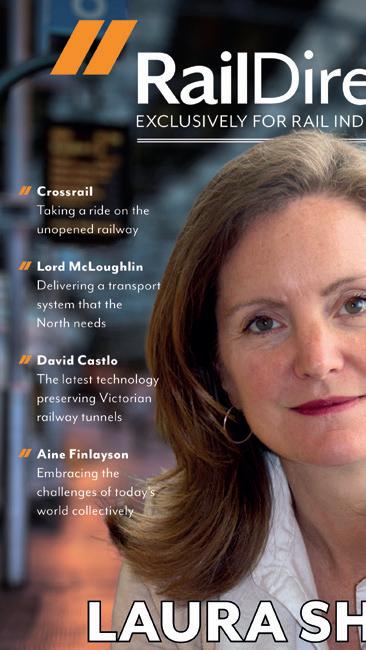
“I think industry recognition is essential to highlight the delivery of best practice and I’m particularly keen to recognise the efforts of cleaning operatives and supervisors, who can frequently be seen to go far beyond the remit of their cleaning duties to support clients and colleagues in all areas”, she says.























One of the attitudes Ms Webster finds most challenging is when she hears people referring to the industry as providing “just cleaning” services. “It’s not ‘just cleaning’, it’s definitely a science, and companies and people delivering the best examples of cleaning and hygiene deserve to be recognised for their work.

“We’re seeing a lot of companies revisit their specification for cleaning as more people return to the workplace following the pandemic.






“Everyone has to realise that the size of the building they own or work in hasn’t changed and it’s necessary to carefully consider and understand what they require from their cleaning operation, especially when workplaces are becoming busier,” she says.



She further explains the essential role of cleaning to support the delivery of many of the FM industry’s growing list of sustainable actions, ranging from recycling and waste management to corporate social responsibility (CSR) and environmental social governance (ESG) initiatives.

“There’s an increasing need for all areas of FM to become more transparent and accountable in their actions and cleaning is at the centre of this. Companies make claims in their sustainability programmes, but it’s essential to support these with accurate data to avoid descending to the level of greenwashing,” she says.

Yet another of Ms Webster’s areas of concern is the issue of pay, with cleaning staff long acknowledged as receiving some of the lowest rates of pay within the FM sector.

“It’s essential that everyone is paid the Living Wage so they receive a decent level of pay for the job they’re doing. This also helps to avoid the race to the bottom and should be a basic element of a smart procurement strategy,” Ms Webster concludes.

I think industry recognition is essential to highlight the delivery of best practice
The Blade is a high-rise building and the tallest in Reading, Berkshire, standing on a site near Forbury Gardens on the eastern edge of the town’s commercial centre.
Owned and managed by Northwood Investors, the facility offers modern office space and at 86m (282ft) tall is visible from a wide area.
The building initially applied for planning permission in 2001, with construction beginning in 2007 and leading to project completion in 2009 at a cost of £32m.
It has a central steel core and 14 floors above ground level, with a floor-to-floor height of 3.77m (12.4ft) and provides a total area of 110,000 sq ft for office use. The building’s façade is a curtain wall system of aluminium and glass and The Blade is strengthened with a pile foundation.
One of the most notable features of the facility is the spire that sits on top of the building. This has been constructed using a lattice frame covered with
rainscreen panels and makes the overall height of the building 128m above ground level.
The name of the building is attributed to its distinctive spire that dominates the upper portions of the design. The Blade was created by Sheppard Robson Architects and was designed for PMB Holdings and Aviva Investors.

Northwood Investors asset management director Nick Turner explains to FM Director that the building was acquired in 2018.
“We had to rectify a few faults and upgrade some of the systems, which took around two years, and then Covid hit,” he says. “But we’re now in a good place and it helps to have a good team around us.”
Like many facilities, The Blade introduced more fresh air into the building and implemented specialist cleaning operations to reassure occupiers that it remained safe to work in throughout the pandemic. But that’s all more or less finished now and the focus of our customers has moved on,” says Mr Turner.
There are considerable efforts devoted to ensuring that the facility provides a high degree of support for its occupiers, which has seen it become a key part of the wider business community.
“Communal space, break out areas and business lounges provide the perfect networking opportunities for occupiers to meet with one another, share ideas and build long-lasting working relationships,” Mr Turner continues. “Events, charity fundraising and social gatherings create positive interactions and help to create and cement a feeling of collaboration.”
The community spirit is supported by the presence of an on-site landlord providing a central point of contact for all occupiers.
The Blade team also works closely with the two Reading Business Improvement Districts (BIDs), The Chamber of Commerce, Reading UK, the local council and various arts and community groups to create a broader network of connections and partnerships.
Other projects are encouraged and in 2022 Reading College student John Browning, who is studying for a diploma in Art, Design and Communication, chose The Blade as the backdrop for a new filmography project. Mr Browning wanted to capture the movement of people using the facility’s lift in a candid way, and spent a week on-site talking to some of the occupiers as they used the lift to ask about their experience of working in the tallest building in Reading.
“His film shares some of their stories, against the unique perspective offered by The Blade’s external lift. As an iconic office building in a vibrant business area, The Blade has a role to play in encouraging inward investment to the town and supporting high growth businesses that need flexibility and space to expand on demand,” says Mr Turner.
By having a Pure Offices business centre within the building, The Blade is able to to provide a supportive ‘incubator’ service to new start-ups, which frequently helps them enjoy rapid growth while avoiding the iterative impact that multiple relocations can create.

Room for all The Blade is currently running at 92% occupancy and Northwood Investors aims to have space always available so that the facility is able to offer occupiers the opportunity to move and grow within the building, which many have done as their business has expanded. The current list of occupiers includes Kaplan, Occuity, Altitude Angel, Pure Offices, Urban Science International, Signant Health, Barton Wilmore, Brandview, Gleeson Recruitment Group, Hays Recruitment, Falanx Group, CMS and Megabuyte.
Discussions are regularly held with both existing and potential occupiers and Mr Turner states that negotiations are continuing with companies that will see the facility reach 100% occupancy in the near future. Hybrid working strategies are being implemented, adapted and further adjusted by many of the facility’s occupiers.
In order to assist with these, The Blade offers secure 24/7 access for all occupiers with the intention of enabling staff to work according to each company’s agreed agile working policy.
From a technology point of view, the building achieved Ewave Telecoms 5* certification in 2021, which means it offers reliable and effective telecommunications connectivity to support all forms of working, including virtual meetings to enable teams to collaborate from different locations.
Access is also provided to flexible office space through the Northwood Investors partnership with Pure Offices which allows occupiers to upsize and downsize as required, flexing the amount of space needed depending on the working patterns of the business.
Mr Turner confirms The Blade has a strong commitment to offering an eco-friendly space, further supported by access to sustainable transport choices in the local area.
“We only have a small footprint for the building, so there’s not much chance to install renewable energy solutions, but we continue to work closely with Hemlow, our HVAC contractor, to monitor energy use and reduce this wherever possible,” says Mr Turner. “They provide a resident engineer who looks after all the plant and equipment and we receive a report every fortnight on the use of timers and controls so they can be adjusted where needed.”
Further to the above, Elite Security staff are also encouraged to use the Hemlow helpdesk to notify the company of any issues identified during their rounds. Northwood Investors also plans to install LED lighting throughout the facility to deliver further reductions in energy use.
It partners with E2 Services for the procurement and management of its energy requirements. This helps to reassure occupiers that it is devoting considerable attention to reducing energy consumption wherever possible, which is one of their main areas of focus.
Communal space, break out areas and business lounges provide the perfect networking opportunities for occupiers to meet with one another
This year has additionally seen the installation of six new electric vehicle charging points for use by occupiers.
The company reports that these have proved popular with occupiers, who are able to access the chargers through a simple recharge programme managed via an app.
“We’re also looking at replacing our chillers, which are nine years old, within the next two years and this should see further energy savings when more modern alternatives are installed,” says Mr Turner.
The Blade facilitates a range of sustainable transport options, including the Reading mainline station, which is located within a five-minute walk of the facility. This includes access to the recently opened Elizabeth Line that provides reduced travel time into and across Central London.
Improved links for cyclists Reading has additionally improved its support for cyclists and the facility is within the town’s 37-mile network. The building also has cycle storage, shower rooms and changing facilities for those choosing to cycle to work.
The Blade currently holds a BREEAM Very Good rating and an EPC Rating of (C) 75. It is additionally continuing to work on its own plan to achieve carbon net zero and will share the details of this when agreed with all stakeholders.

“Many of our occupiers are building sustainability into their business plans, including zero carbon, environmental social governance (ESG) and sustainability, with lower emission targets a key priority.”
Another option that is continuing to prove popular with occupiers is the ability to lease fully furnished offices. “We find that customers are often happy to pay a premium for this, which allows them to relocate with the minimum of fuss and interruption to operations,” he says.
“This can include the installation or removal of internal partitioning, rather than structural alterations, so can be reasonably quick and easy to complete,” Mr Turner concludes.
M&E Hemlow
Cleaning EcoDrift
Security Elite Security
Kone
Reactive repairs and maintenance Crown Interiors
Coffee machine Scanomat
Milk deliveries West Horsley Dairy
Internal plant maintenance Planteria
Window cleaning Aquamark
Cradle maintenance Introland
Cladding inspections Sandberg
Pest control Pest UK
Gritting Mitie Landscapes
Fire alarm Pacific
Access control and security systems Dankosec
Visitor management system Proxyclick
surveys
Ligtas
Energy management E2 Services
cover Focus Resourcing
consultancy TFT
Gerald Honey Partnership
supplies Lyreco
Refuse collection Select Environmental
bins Azure
Handyman
Newspapers
BMS
Doors/
Jim Boyland
Brighton Newsagent
BMS Control Systems
DRS
Delmatic
PTSG
Pumps/drains ACS
Aquafine
PFC


arlier this year, Stephen Peal became Group Managing Director of YorPower, PPSPower, Glenace and Generator Warehouse. This was a clear sign of the new direction of the group following the reorganisation of its business structure and premises. The resulting ‘one family’ approach is already proving to be a far more efficient way of working, which capitalises on the individual strengths and growth of each company.
PPSPower is best known for providing reliable maintenance solutions for both generators and UPS units. YorPower operates nationally and internationally to manufacture, install and commission generators to provide back-up and prime power solutions for its wide-ranging customers.
All areas of the business now work together, from the company headquarters in West Yorkshire. However, to ensure the entire workforce of the YorPower group is fully embracing the new business structure, group managing director Steve is consulting throughout the company, presenting a shared vision, and discussing this one to one with employees.

As a qualified Mental Health First Aider, Steve has a highly developed understanding of how his staff are performing, what motivates them and any factors that may be inhibiting them from delivering optimum performance. The aim is to get everyone engaged in the new way of working under a single brand – rather than a collection of independent companies. To supplement the consultations, there will be a group-wide survey to find out what people think are the company’s strengths and weaknesses.
As ever, Steve is ensuring the consultations are a two-way dialogue so that his staff also know what makes him feel valued – such as people popping in to see him and seek his opinion. “People should never say, ‘Sorry to bother you.’ I want my staff to have their say in the direction our company is taking. We are a family, and we should be able to thrash out our differences and come through the other side stronger. We don’t have problems; we have opportunities for improvement!

“I believe I am a people person and I have always treated colleagues and employees as our greatest asset. It is essential that everyone shares the same vision and is part of defining that. I very rarely feel the need to tell anyone what to do, I include them in where I feel we need to go and agree together on the actions required to achieve our aims. I want to be the back-up power company everyone wants to work for.”
The YorPower group is also taking a progressive, proactive approach to its carbon footprint. A little earlier in 2022, Steve entered discussions with Neutral Carbon Zone, which helps organisations take an expert look at their sustainability agendas to see how they can slash their carbon footprint in ways they may not have expected.
Increasingly, customers and employees want to work with companies that demonstrate a commitment to becoming carbon neutral. It’s early days in this project but YorPower will aim to move from Bronze, up to Silver and Gold and finally Platinum – at which point it will be among the select few organisations leading the way on sustainable working practices.
As 2022 draws to a close, the YorPower group can look back upon a productive year in which the group of companies have started the process to become restructured into one brand, under which all individuals and constituent companies are now working efficiently to offer a full back-up power solution. The next few months will build on this early progress and we look forward to keeping readers informed in FM Director.
Combining YorPower and PPSPower into a single business will provide the platform to generate more growth while supporting clients and employees alike
Customers and employees want to work with companies that demonstrate a commitment to becoming carbon neutral






ne of the more highly pressured areas of FM service delivery is relocation, particularly the projects that involve complex multisite moves, tech relocation and oversized equipment such as laboratory and hospital relocations.
These have often been timed to begin on a Friday evening and be completed in time for staff members to arrive at their new location on Monday morning and begin work, with all IT and networks operating to best effect.
Among the more positive outcomes of the Coronavirus pandemic has been a change to the weekend working requirement in many instances, in the experience of Clockwork Removals branch manager Richard Lear. In addition to the timing of moves, he has noticed a number of other changes in relocation project requirements.
The application of hybrid workings models has been a significant factor in this change of requirements and attitudes towards relocation projects, he finds.
“Many businesses are still getting used to not having as many staff in the office on a full-time basis and as they consider how to adjust or adapt these strategies, there have been fewer companies moving to new premises. As people use their workspaces differently, we have seen an uptake in our office reconfiguration, restack and internal relocation services,” he says.
Another development attributed to the pandemic is that of changing demand for storage space.
“As businesses re-negotiate leases or make decisions on upsizing or downsizing their workspace, we provide flexible, short-term storage space for their workplace furniture and equipment. If a business does make the decision to downsize, we offer WEEE recycling and have a network of community partners to take donations of furniture and to handle the ethical recycling of equipment. Our robust CSR strategy and ISO 14001 for environmental management ensure consistently high environmental standards.”
While these topics are considered important elements that support relocation projects, one of the main aims of Clockwork Removals is to establish effective collaborative communications with its clients. “We find it’s essential to work towards true partnership with our clients and establish a solid relationship.
“We know how busy FMs are and we are on hand to safely deliver their relocation projects on time and within budget,” he continues. “By reaching out and engaging with FMs we can understand their requirements and ensure we have robust pre-planning in place to minimise downtime to their business.”
“I really enjoy the social interaction with our clients and we usually find that this helps us to build
trust through engaging in honest conversations. This sometimes means we have to have difficult conversations, but these are essential in any relationship and they will help to avoid difficulties emerging further down the line.”
One example of the difficulties that can emerge within relocation projects is when a removal company arrives on site to find it is expected to complete tasks not included in the original contract, requiring more time and cost to complete. Mr Lear states that making the necessary level of effort to engage before the move helps to avoid many of the potential pitfalls.
The company completes a detailed survey beforehand to gain an in-depth understanding of the different aspects of the relocation project. All clients have a dedicated project manager to understand the full scope and oversee the entire relocation. Move managers will then be on-site during the relocation to ensure all plans are followed through and to execute any changes. With 25 years of experience in the industry, we understand that large commercial relocations can change and evolve day by day.
The success of the company’s approach to delivering relocation services can be judged by the fact that much of its business comes from customers placing repeat orders or recommending its services to others. “A lot of our business comes from word of mouth, and we make a great deal of effort to maintain a good reputation,” says Mr Lear.
He further explains that these efforts include the gaining of industry certifications, combined with the training of staff wherever necessary. “We find that some projects require staff to have background checks in place and this is never a problem for us,” he adds.
The gaining of accreditation and staff training inevitably involves added expense to the company and one of the issues it has experienced is competing with companies that have not invested in their businesses. “You’ll always find someone that can offer a cheaper service, but it’s important to understand that cheaper is not always better and may involve increased risk. We make sure that all items are packed in secure cases and plan in advance to ensure everything is moved the minimum amount to reduce any risk of damage.”
Another aspect of investing in the company’s workforce is that staff are often recruited in advance of work levels increasing to allow them to be trained to the correct level. “We regard our staff as the most important part of the business and they are the reason we can advertise ourselves as providing national cover with local expertise,” says Mr Lear. www.clockworkremovals.co.uk
A lot of our business comes from word of mouth, and we make a great deal of effort to maintain a good reputation
FM Director approached a selection of industry experts to ask for their views on how CAFM systems will continue to develop and assist in the running of facilities and estates
With the FM sector continuing to deal with the same challenges affecting all areas of the UK business environment, including supply chain issues, recruitment and rising prices, one of the most common areas of interest to deal with these while improving the management of facilities is increased use and application of technology.
Computer-aided facilities management (CAFM) systems have long been used by both FMs and service providers to assist in the running of facilities and estates, although there is continuing debate on how widespread these have become. However, the changes and challenges to the business environment that have emerged over the past few years have seen a consensus emerge that technology application is

increasingly proving the best method to meet these developments and the expectations of customers, facilities users and colleagues.
Trios Group head of managed services Kirsty Rich tells FM Director that she believes many users view CAFM systems as an asset database, setting out a 52-week plan for upcoming maintenance tasks.
“However, the truth is CAFM systems are so much more. Deployed well, a CAFM system becomes an insightful property lifecycle solution,” she continues. “CAFMs should bring the property portfolio to life.”
She further explains that the CAFM system should be used for analysis and assessment in a number of areas. These can include contractor performance, property compliance, asset management strategy,
month-on-month commercial position, project works planning and delivery, carbon reduction and net zero targets, along with a raft of other options to meet the aims and expectations of clients.
“Advanced CAFM systems are already available and are rich with property data. In conjunction with expert support from your provider, these advanced CAFM systems enable organisations to design and deliver strategic, innovative facilities projects and cost-saving initiatives,” says Ms Rich.
Further opinion on CAFM systems and their potential to adapt to changing conditions is provided by Service Works Global marketing and operations director Hazel Bedson, who says: “As we enter the new normal of the post-pandemic world, the FM world is changing.
“The way we work is evolving, especially with the introduction of hybrid-working potentially becoming the future, replacing the old nine-to-five lifestyle. CAFM systems will need to advance to be able to assist FMs, to support their workers. Many companies will have a CAFM system already in place to help with asset management, reactive maintenance and streamlining it.
“However, with this new wave of working, along with the incoming energy crisis and legislation change, CAFM’s requirements have gone beyond purely asset management, and there is huge scope for smart technology integration.”
Ms Bedson provides the example of sensor integration as a means to assist with the gathering of data for a number of purposes, including office usage. This can be used to forecast a relocation, should fewer employees choose to come to the office; or a reconfiguration to ensure the workplace can accommodate the peaks and troughs of hybrid working.
“Similarly, building information modelling (BIM) integration with CAFM will help those who are personally liable for maintaining safety standards, as the Building Safety Bill comes into force. BIM data informs CAFM software by providing accurate, as-built information about a facility, its building fabric, assets, and components, to support effective maintenance strategies and most importantly, ensure occupant safety,” she continues.
CAFM systems will additionally help with advancements in FM delivery from a sustainability point of view.
With the focus on reducing the environmental footprint of the company and meeting the challenges of the forthcoming energy crisis, more and more businesses will be looking to find ways to cut back on their energy costs. CAFM systems can help to assess the efficiency of an asset, and therefore inform the user of their options for repair or replacement, along with the costs associated with both. This will help FMs to make more informed decisions, not just around energy costs, but also the environmental impact of such energy usage.
“CAFM has a big role to play in FM delivery, and an expanded role for all these types of concerns. Of course, there remain the traditional issues of maintenance and facilities management, but also the importance of sustainability, and social impacts make CAFM more indispensable than ever,” Ms Bedson concludes.
Bennett Hay business development director Zoë Watts agrees that technology is having a transformative effect on all business sectors, including hospitality.

“We are seeing a significant impact through the ability to customise and personalise the workplace experience. CAFM’s influence is now realised at numerous touch points in the daily routine.”
Guest services - from the initial welcome of employees or guests, CAFM is being integrated into organisations’ employee apps and is helping plan and understand the new hybrid working week. It also augments onsite security for both the teams in the building and any suppliers and contractors too.
Robots may not be far off; automation is an absolute requisite in tailoring and customising the workplace experience
Zoë Watts, Bennett Hay
Space planning - with ‘hybrid’ now the standard workplace narrative, organisations are adapting to new densities and workflows. CAFM gives valuable informatics to plan for peaks and anticipate low densities. It means heating and lighting can be programmed accordingly, as can the levels of food and drink and the staffing required to service the new Tuesday, Wednesday, Thursday routine.
Food and drink and office life - with so many workplaces offering an employee app, which is linked to CAFM, food and drink can be ordered from meeting rooms and even from an individual’s personal workspace. Digitisation enables users to specify their dietary preferences upfront as well as make any potential payment for items.
“We’re seeing the return of the ‘tea trolley’ - albeit updated to be more appropriate to today’s tastes and demands! Whether we see a fully stocked robot wandering each floor remains to be seen, but it’s a definite possibility and could easily be rolled out,” she continues.
As corporates incentivise their teams with clublike experiences as part of their new workplace and remuneration, booking classes is being done through the company app which in turn will be linked to software and MI.
“The benefit of technology is of course management of information and to this end we can anticipate demands better and be prepared for peak service times and days and can plan our staffing levels correctly.
“Ordering and procurement is also being impacted by CAFM. We are seeing automated self-ordering already taking place as stocks diminish and tech automatically reorders barcoded items as they pass through to recycling. We see one of the biggest impacts of CAFM being stock control and procurement.
“Robots may not be far off; automation is an absolute requisite in tailoring and customising the workplace experience but that welcoming smile and warm greeting can never be replicated by technology,” says Ms Watts.
The last word on this topic is provided by MRI Software director of product Paul Bullard, who says:
“CAFM systems ultimately help businesses understand the data behind the most effective way to operate and maintain their facility. They ensure FMs elevate their workforce, boost efficiency, and maximize the lifecycle of their properties, assets, and people.”
He further states that the systems that are truly enabling agility and adaptability are the ones that FM teams need to adopt going forward. CAFM software tools need to be increasingly flexible, ensuring proactive support for organisations navigating the constantly changing environments and requirements placed on the facilities industry.
“We are entering an era of digital-driven facilities management. The industry has been accelerated into change driven by remote management, data-orchestrated activities, and the demand for alternative maintenance strategies. The data from devices and building management systems is driving an augmentation of traditional calendar-based maintenance practices,” he continues.
A CAFM system now needs to look further than relying on the human as a sensor (telling us when things need repairing but still so much a valued interaction) and to drive the facility operations through fact-orientated data points. To support this, the CAFM system must provide insights to the users in a way never seen before.
“Traditional outputs have looked back on our activities, how many PPMs were completed to schedule? How many reactive calls met their SLA? And what penalties have we incurred this month?
“A great example of this advancement is resource planning. If we shift from the calendar to runtime, condition, or instance-based strategies, how do we know how many, when, and with what skills and resources will be needed? The calendar provides a level of certainty on this requirement, so to maximise the opportunity, we need the ability to forecast effectively for alternative maintenance strategies.
“By combining the huge volume of CAFM data, the real-time information driven by connected technologies, as well as optimising the human as sensor interactions through these insights, we are truly enabling a Digital Driven approach as the future of Facilities Management service delivery,” says Mr Bullard.

The application of artificial intelligence (AI) combined with machine learning (ML) is another supporting element within the development and application of CAFM systems, helping to deliver detailed analysis of data. This is another aspect that is becoming increasingly important, helping to provide justification and proof of return on investment for those deciding to increase their spend on data gathering and analysis.
With awareness growing of the need to ensure that systems are designed to support user ambitions from the outset, expert advice confirms that this will be a major factor to ensure CAFM is being used far more effectively and generate an increasing number of benefits as a result.
Following the challenges and changes of the pandemic, alongside the evergrowing issue of supply chain and parts availability, metrics that have previously been used to judge whether a service provider’s SLAs (including those for servicing and maintaining catering equipment) are effective have in some cases become completely irrelevant.
The message from the team at Hobart Service is clear –is it now time to review and rethink your SLAs?
Across the industry, everyone understands the importance of mitigating any downtime. When a piece of equipment breaks down, the critical factor is the time it takes to fix the equipment, not the time it takes for a technician to arrive on site.
However, some providers promise quick-reaction SLAs, and meet them, yet are not always in a position once they arrive on site to provide a fix. This can result in equipment standing dormant for days while parts are ordered or they wait for a more qualified technician, bringing operations to an abrupt halt.
Many people in facilities management roles have a level of responsibility for the performance of fieldbased service providers. As an industry that is heavily focused on customer satisfaction, their first-time fix rate is crucial.
Put yourself in the customer’s position: when something goes wrong, they want it fixed straight away. They don’t want to put processes on hold, losing both time and money in the process, while an engineer attempts on multiple occasions to rectify the issue, whilst being monitored by an arrival time on site SLA or KPI.
For businesses with a first-time fix rate of over 70%, customer retention was at 86%. Those with a first-time fix rate of under 70% saw their customer retention rate drop to 76% — a decrease of 10%.
There are multiple ways to improve first-time fix rate, ranging from training employees to the highest standard possible on the equipment they will service/ repair to ensuring a strong supply chain of spare parts and/or technician van stock and encouraging a PPM programme.
A PPM (planned preventative maintenance) service contract gives customers ultimate flexibility, especially with all-inclusive contracts which offer complete peace of mind – with all OEM parts, labour and travel included. These leave customers to rest assured they are getting the leading service for one fixed cost with absolutely no hidden extras or small print.
Planned preventative maintenance checks are essential to identify any potential problems with your equipment, minimising any future downtime and costly repairs and allowing service technicians to check for worn parts, pressure issues and health and safety concerns and fix the problem before it becomes costly and disruptive – which will also negatively impact first-time fix success rates.
Keith Mackie, managing director of Hobart Service:

“Our advice to any businesses who are currently under a time-based call-out SLA, yet experiencing issues with first-time fixes or parts availability, is to revisit the contract and SLA regularly, whilst discussing and exploring what is business critical. Response times simply state how quickly the service provider must respond to your report of a problem (even if just to confirm receipt of your request). Repair times (deadline for the problem to be fully solved) also tend to be stated as non-binding targets, or sometimes, are left out entirely.
“Customers need an approximate deadline for solving problems. Vendors may explain that repair times are purposely omitted because they cannot estimate repair time until they know the root cause, however, no matter the cause, you are paying for a service you are not getting; therefore, it is entirely reasonable for you to ask for a repair deadline, with a remedy if missed.”
Given today’s fast-changing environments where catering service and maintenance is provided, service level agreements (SLAs) between customers and third-party service providers can often drive the wrong outcomes.
As an industry that is heavily focused on customer satisfaction, their first-time fix rate is crucial
With levels of appreciation of the benefits available from the correct application and use of software and digital solutions continuing to rise, MRI Software managing director for facilities management James Massey provides his views on the impact and expectations for proptech systems.
His career has spanned a number of roles in the supply of these systems, progressing from product consultant to chief operating officer (COO) and then managing director (MD).
“I started my career at Capita Software, which specialises in a variety of software solutions. I later moved on to social housing software specialist, Castleton Technology, where I was COO when it was acquired by MRI. And now my current position is MD – Facilities Management at MRI, putting me in a
leadership role at a global level offering a broad suite of residential and commercial real estate software,” he explains.
“Throughout my career, the most critical challenges have revolved around evolving and steering strategic decisions – and ensuring stakeholders, partners, and customers remain centred in all decisions to ensure users enjoy a great experience or interaction with whichever software platform they have deployed and are using.”
He joined MRI Software in mid 2020, which was the timing of its acquisition of Castleton Technology.
“Through the acquisition, my role at Castleton shifted from COO to strategy director, specifically for the social housing sector, drawing on the wealth of knowledge and understanding of the market I had accrued in my previous position,” Mr Massey
continues. “The key expectations of my initial role were to develop strategies for growing that area of the MRI business, contributing insights for ensuring customer satisfaction and longevity.”
Having established these, his career developed further when he was promoted to his current position. Mr Massey states that his leadership skills and other attributes developed through his former positions continue to support his new position and increased focus on the FM sector.
“Ultimately, my current role has a much wider focus with more of a responsibility for steering and integrating the entire FM team. In my role, I understand that decision-making has a lasting impact on the business – I need to take a view of MRI’s existing and future FM proptech offerings,” he continues.

Continuing development to support the merger of FM and real estate with proptech software
James Massey has enjoyed a long career in the software and digital solutions supply side of the FM industry and shares his thoughts on this and how the industry can benefit in the future


“We also see a rise in the migration from enterprise solutions to microservice. People have realised that using multiple systems isn’t the best choice for their business because they aren’t integrated or communicating with each other in the way they need to be – hence the increasing demand for Integrated Workplace Management Systems (IWMS).”
The reopening of facilities and growing numbers of staff attending these has created further demand for effective systems. “Now that facilities, offices, physical retail outlets, pubs and restaurants and other public spaces have opened with little-to-no restrictions, business owners are trying to figure out if the space they had pre-Covid meets their current needs or, ultimately, how they can maximise their space,” he continues. “FM teams are now playing a critical role in helping companies revolutionise the workplace for a fundamentally reshaped postpandemic working world.
“For example, deploying proptech solutions like MRI’s OnLocation enables organisations to gain complete visibility of employees, contractors, service companies, and other visitors who might have a physical presence on their premises.
“This data can then be used to understand who, when, and how long people are on their premises, helping organisations to better gauge what is happening at their sites and maximise the potential of the location based on that data.
Many businesses were forced to rapidly accept and deploy remote technologies through Covid.
“Even as we return to having more people in the office and, in many cases, hybrid working arrangements, a lasting result across many industries is that the adoption of modern tech solutions will remain, as organisations need more ways to tightly manage, maintain, and monitor their properties,” says Mr Massey.
There have been significant advances in proptech systems and he believes that the adoption of remote and modern technologies has gone too far not to continue to be embraced. The working world is unlikely go back to what they once saw as “normal”, he says.

“Regarding the direction it will go in, I think people are focused on forecasting – making intelligent decisions for the business through data and artificial intelligence.”
Mr Massey further explains how the merging of FSI enterprise-class FM software with the MRI Software brand has further increased both organisations’ ability to support FM teams across a range of industry sectors. Combining the two has resulted in FSI’s FM software being augmented by the comprehensive MRI overall solution portfolio, resulting in a raft of benefits for IWMS in particular.
“IWMS platforms ultimately help real estate and FM teams gain increased visibility and control over lease management, workplace operations, and financials.
MRI has redefined the traditional IWMS concept to improve long-term, strategic property and portfolio management with XWMS - an Extensible Workplace Management System.
“XWMS is a cloud-based platform designed to better serve the increasingly sophisticated and unique needs of real estate and FM managers. Together, the combined offerings further improve MRI’s ability to serve landlords, contractors, and tenants better, creating a single experience and better usability across all applications.”
He further states that the combined team now provides an expanded FM offering that enables property owners, operators and occupiers to improve building sustainability, data visibility, mobile connectivity, and tenant satisfaction to support a comprehensive building and workplace management approach.
One of the most notable developments within this has been the creation of the MRI Software integration team, which is tasked with looking after acquired businesses to ensure continuity and that customers remain supported throughout the various changes and decisions resulting from their purchase.
“FSI was well-known for having a unique blend of industry expertise and technical know-how. This legacy and its power in the industry will remain – blended with MRI’s rich product portfolio and global partners,” Mr Massey continues. “MRI and my team will continue to develop and expand to ensure customers have the data and solutions they need to best support business operations.”
Having made the necessary changes and integrations within the business, he confirms that the majority of requirements have been addressed and an effective focus has been established. The team and products are fully integrated, the product is rebranded and being supported by a clear strategy and direction of where it needs to go and how it will be taken forward.
This will both assist and be further supported by the MRI drive to continue development of its broader ecosystem, bringing together more technologies to contribute to a shared service portfolio. This will see the further development of a system where everything is connected, open and accessible.
“MRI has a continued focus on real estate and associated business functions, with an intent to enable innovation for underserved markets, including FM solutions for social housing, which I have been passionate about throughout my career.”
Mr Massey continues: “We aim to drive value through even broader integration capabilities, automation, and artificial intelligence. This includes the integration of acquired and partner applications for critical business solutions; for instance, we are integrating energy management capabilities with FM to turn insight into action.
“MRI is intent on simplifying preventative maintenance, work orders, and maintenance requests through automation and intelligence. For example, the IoT hub within FSI enables the integration of FM software with smart building devices, creating greater access to data and driving smarter business decisions.”
Looking further ahead, Mr Massey states that the business is satisfied with its team and its investment and looks forward to continuing to innovate for the FM Industry. This is intended to further support its established and future customers with the best portfolio of solutions available.
“We will continue to work with our customers to help them integrate the entire workplace, enabling a connected, digital-first experience. FM teams are now playing a critical role in helping companies revolutionise the workplace in the post-pandemic world.
“Moving forward, we see real estate owners, occupiers, and operators adopting strategic FM technologies to support smart buildings and mobile capabilities,” Mr Massey concludes.

We aim to drive value through even broader integration capabilities, automation, and artificial intelligence
Established in 1972, SAEMA works alongside national and international regulatory bodies developing and maintaining industry standards and publishing a number of free-to-access guidance documents. Members install and maintain a wide variety of suspended access systems used to work on the façade of buildings.
SAEMA is a founding member of the Access Industry Forum (AIF), which is the grouping together of all work-at-height trade associations with the common aims of promoting safe working practices for working at height. Each member is the lead organisation in its own specialist work-at-height sector. Six key objectives form the foundation of SAEMA’s work:
1. To participate in the development of national and international standards relevant to the façade access equipment industry.
2. To encourage adherence to safe and best practice for the provision of access to buildings and other structures for the purposes of cleaning and maintenance.
3. To promote co-operation between its members and the work at height industry in general.
4. To co-operate with other organisations, specialist bodies and institutions (property developers, architects, planning supervisors, insurance companies, facilities managers, etc) involved in the provision and maintenance of façade access systems and equipment.
5. To act in the best interests of the client in all matters relating to the design, manufacture, installation, maintenance and testing of systems and equipment.
6. To educate duty holders and suspended access users through their bespoke industry-leading training platform.

In October 2022, SAEMA User Training was a Bronze Winner at the Association Excellence Awards in London. The Association Excellence Awards salute, celebrate and encourage the vital work that associations, trade bodies, professional organisations and chartered institutes do for and on behalf of their members to ensure their voices are heard and their causes are championed.
SAEMA User Training was launched on 18 January 2021 as a new and unique way for those who work at height, operating suspended access equipment, to be assessed on their technical understanding of the processes and equipment involved.
The aim is to enable a greater number of engineers and operatives to become accredited as safe and competent, contributing to a safer façade access industry with fewer workplace accidents – SAEMA’s ultimate aim.
The innovative virtual training platform represents the next evolution in SAEMA’s commitment to advancing safety through raising the standards in best practice.
SAEMA (Specialist Access Engineering & Maintenance Association) is the national trade body for the permanent and temporary façade access equipment industry
The online training platform continues to grow in popularity
It is simple yet powerful, engaging yet time efficient, enabling employers and their people to gain the knowledge and understanding needed to stay safe at height, with important certification from the acknowledged experts in this specialist sector.
Part 1 of SAEMA User Training is taken remotely, at the user’s convenience. This unique and engaging tool can be accessed securely on SAEMA’s training website via the user’s computer or device. SAEMA worked closely with its marketing and communications agency, Mercury Group, to create the online training platform: training.saema.org. This is accessible from the main SAEMA site: saema. org and explains exactly how the training works, what it involves and what the user needs to do in the following simple stages:
Part 1 includes an introduction followed by eight sections for the user to complete. The platform contains a number of short videos for users to watch, culminating in a remotely invigilated test and gives users two opportunities to achieve the required results.
After each section is completed, the answers are saved so that users can come back and complete the other sections later if they wish.
The user must pass the test before they are certified to move to Part 2 – the practical on-site training, which has a standardised syllabus. Upon passing Part 1 of the test, a certificate is sent to the user as proof of their accreditation.
A copy can also be sent to the employer. The user is then also issued with a virtual card which is stored on their smartphone and can be checked by Duty Holders in real time when users arrive on site for Part 2 Training.
Following successful Part 2 on-site training, the virtual card will be endorsed with the site details which can also be checked in real time by Duty Holders to ensure that users are trained properly in the use of the systems on site.
Training for Duty Holders will be launching in 2023. It is designed to equip them with the knowledge they
require to manage suspended access equipment on their sites, in a compliant manner. This includes:
Knowing what the standards and legislation require them to do to remain compliant
Understanding what maintenance and testing is required
Knowing what to ask for when managing users (Parts 1 and 2)
Using the same sector-leading system as Part 1 of SAEMA User Training
Training can be undertaken remotely, at the Duty holder’s leisure. It is cost effective and won’t intrude on their working day.
Falls from height remain one of the biggest causes of workplace fatalities and major injuries, as reported by the Health and Safety Executive (HSE). Any employer or person who is in charge of working at height has a legal duty to make sure their people have sufficient knowledge and experience to carry out their work safely and competently.

Until now, the task of giving operatives the required level of background knowledge and experience was widely variable. That’s why SAEMA Training is advancing the industry with regard to training and worker safety delivered consistently to all users of suspended access equipment. It removes the need for operatives to attend a classroom course; instead, they can be trained and assessed on their background knowledge of suspended access equipment anywhere that has an internet connection. The test is carefully designed to be both comprehensive and simple to use.
The SAEMA online training platform produces great results for those working UK-wide in the permanent and temporary access industry, without costing a lot of money. The cost for accessing SAEMA’s e-learning suite of 10 videos, for completing the innovative multiple choice test system and for producing and sending a certificate of competence, is just £75.00 per person. As such, it raises standards for people working in the sector in a safe and affordable manner.
The online training platform continues to grow in popularity. By May 2022, the 750th virtual card was issued – less than 16 months after its launch in January 2021. At the time of going to print, over 980 virtual cards have been issued.
The innovative virtual training platform represents the next evolution in SAEMA’s commitment to advancing safety through raising the standards in best practice
ts innovative, forward-thinking approach has come to the attention of more than one notable industry initiative, including Digital Enterprise, which has named it a Top 100 company for the second year running.
The Digital Enterprise Top 100 campaign profiles and celebrates 100 of Leeds City Region’s most digitally innovative, transformational and resilient businesses from across nine Leeds City Region local authority areas (Leeds, Kirklees, York, Harrogate, Craven, Calderdale, Bradford, Selby and Wakefield). The businesses included in this year’s index represent a diverse range of industries from innovative shed build and design firm Power Sheds; popular Viking-themed visitor attraction The JORVIK Group; digital training and suppliers for drones, Coptrz and car exterior design and modifications company, Maxton Designs.
As a company Volta has worked hard behind the scenes to support the use of technology, investing in digital technology including its own online portal for its customers. It allows them to: login from any device 24/7 365, access their paperwork/certificates in relation to projects carried out for them and view a real time snapshot dashboard of their current compliance status. This was the impetus that saw Volta be included in the elite list for the second consecutive year.
Volta Compliance, which was established in 2016, has grown year on year. This has been fuelled by a genuine passion for power: hunting down installations in need of an upgrade, checking in regularly on customers’ appliances and readying the alarm bells to ring when needed. Projects are ticked off, documented and stored in our online portal to give customers peace of mind and a record of compliance. Its dedicated six-strong team now supports customers in the manufacturing, food and drink, pharmaceutical, and aviation industries, as well as housing associations and community interest companies.
In 2022, Volta’s Managing Director, Richard Carr, became one of the advisors of the Manufacturing Advisory Directorate (MAD) Yorkshire. This is a collaboration between Yorkshire’s finest independent consultants, managers and interims which arose from a shared mission to ensure manufacturers have direct access to the support they need, when they need it.
Chairman of MAD Yorkshire, Neil Jaggar said: “Now is the perfect time to bring the Summit to Yorkshire for the manufacturing industry. After a rough couple of years, our industry needs to focus on innovation and how we can continue to thrive, no matter the circumstances.”
The MAD Yorkshire summit took place on 19th July. Topics in the summit were centred around grant opportunities, IT and Energy, accounting and legal, sales, marketing, growth operations, health and safety, compliance and strategy.
In August, it was announced that Volta had been shortlisted in two categories of the first ever Connect Yorkshire Awards.
The inaugural Connect Yorkshire Business Awards will take place on 30th November 2022 at the Royal Armouries Hall in Leeds. Volta Compliance is shortlisted in the ‘Small Business of the Year’ and ‘Outstanding Achievement’ categories.

Volta is a proud Yorkshire company, becoming the trusted name for managing the complete electrical contractor services in full for businesses both in Yorkshire and UK-wide. Richard Carr and his team are looking forward to the ceremony in Leeds at the end of November.

In September, Volta announced that it has gained a place on Goldman Sachs’ coveted ‘The Resilient Business’ programme.
The company was already part of the Goldman Sachs 10,000 Small Businesses UK alumni prior to being offered a place at ‘The Resilient Business’. Richard and his team will join a select number of other businesses at the autumn 10,000 Small Businesses UK convening, that will be hosted in Oxford on Tuesday 29th and Wednesday 30th November 2022.
The investment banking giant developed the 10,000 Small Businesses UK programme to provide high-quality, practical education and business support to leaders of high-growth small businesses and social enterprises across the country.
As Goldman Sachs has said, these small businesses play a vital role in creating jobs and driving economic growth in the UK through innovation and market expansion. Volta Compliance is proud to be amongst these businesses.
2022 has been a year like no other for Volta Compliance (Volta), the Leeds-based electrical contractor
Small businesses play a vital role in creating jobs and driving economic growth in the UK

riginally from a creative and consulting background, Place Group co-founder Simon Rule has focused on working in the education sector, with a mission to improve the life chances of young people
Over the past 20 years, he has helped in the delivery of hundreds of millions of pounds worth of construction and FM projects, many of which have involved the rebuilding, improving, operating and maintaining of schools.
“Through our consultancy, procurement and contract management services, we have devised and implemented transformation, efficiency and savings programmes for customers across education as well as central government and local government, healthcare and the emergency services,” he says.
Place Group was established in 2002 with the expectation of “doing good things in education
– yes it that was broad,” he states. “It was a time of change for schools, and soon I found myself advising local authorities on how to transform their school estates and access funding through the Building Schools for the Future programme, having been involved in delivering one of the Department for Education’s exemplar designs for urban secondary schools.”
This progressed into Place Group becoming one of the early pioneers in the Academies programme and developing one of the first Free Schools. The business has since helped to establish over 100 new schools in areas of high demand and deprivation.

Mr Rule explains that his role as a business owner has always had an entrepreneurial focus, including the ability to devise strategies and solutions that meet clients’ future requirements.
“It can be hit and miss second-guessing policy change, but in the main we have been at the forefront of delivering central government pilots and implementing
new national programmes aimed at improving outcomes and delivering optimal efficiency,” he continues. “Having an insatiable thirst for knowledge, I have learned from experts in their fields who I have had the opportunity and pleasure to work alongside.”
He finds that his role can become overwhelmed with administration over time and as the business grows, but giving equal priority to strategy, sales and operations, along with clients and partners, helps to maintain the appropriate balance.
“But without doubt, working with equally inquisitive and impassioned colleagues, and observing their growth and development provides the greatest sense of collaboration and achievement,” says Mr Rule.
His company has been increasingly involved in assisting educational facilities with planning and applications for BEIS decarbonisation funding for a number of years.
Simon Rule explains how his work with the education sector is increasingly including the delivery of carbon reduction assistance and advisory services
This has included the procurement of LED light replacements, solar PV panels and EV charging points.
“We have also recently expanded our services to help organisations across the public sector meet their net zero targets, working with FM businesses who are able to implement, maintain and monitor energy consumption reduction and decarbonisation strategies.
“The pace of change is both exciting and critical if we are collectively going to meet the Government’s deadlines of 2035 and ultimately 2050 to be net zero,” he says.

“In respect to net zero, there are huge implications for the FM and real estate sectors. Buildings are the second largest source of emissions in the UK at 20%, with manufacturing and construction sectors accounting for around 14%, and surface transport accounting for the largest emissions at 23%.
“What’s great to see is how the FM market is rapidly responding to help their customers reduce emissions by introducing new innovations and services. We are working with leaders in the market to help the public sector accelerate its programmes and embrace new approaches and technologies to improve their environments and contribute to the circular economy,” says Mr Rule.
He adds that the reopening of facilities and increasing workplace attendance feels like it has given fresh impetus to the net zero agenda. Last year’s COP26 conference has also resulted in placing net zero as a high priority for organisations, as well as making it a key consideration for the workforce and encouraging more people to work within sustainable environments.
“ESG, B Corps, Carbon Reduction Plans, EV100, EP100 and RE100 initiatives are no longer just buzzwords, campaigns and objectives, they are measurable functions, and the FM sector is central to helping its customers achieve such standards,” he continues. “With the new ESOS phases 3 and 4 requiring more detail and evidence, and SECR reaching more organisations, the net zero agenda will continue to rapidly develop.”
He further states his belief that the current issues such as rising prices and high levels of inflation are encouraging more individuals and companies to reduce their energy consumption and carbon emissions. “Green energy costs have become more comparable with fossil fuel (brown) energy costs, and despite the huge pressure on homes and businesses to cover rising prices, there appears to be a growing attraction to alternative energy sources.
“Offshore wind farms are well on the way to generating a significant amount of energy for the country, and with it of course comes the benefits of a reduction in carbon emissions.
“More and more public sector organisations are accelerating their ‘invest to save’ plans to generate their own energy through solar to reduce bills, and encourage changing behaviours amongst their staff, customers and students to reduce energy consumption,” he says.
This is resulting in the FM industry being asked by its customers to help reduce consumption and costs, engage in the circular economy and help them to achieve their Scope 1, 2 and 3 carbon reduction targets. This means the sector has become key to meeting the climate change challenges and is likely to see more work opportunities created for those proving their ability to deliver.
Mr Rule further explains that his company is engaged in expanding into new areas of its core consulting, research, project management, procurement and contract management activities across the public sector.
“Facilities management remains central to our proposition, with some 80% of our procurement contracts focused on FM. It’s a really exciting time for growth potential, entrepreneurialism and advancement despite the human, environmental and economic challenges we all face.”
Plans are currently being refined for the new Place Group net zero service offering, which will launch in the next few months. This is designed to extend its remit further across the FM sector and reflect its position as a key driver to help organisations meet their decarbonisation targets.
“Over the medium to long term, we will be helping our clients devise and implement their end-to-end net zero strategies in partnership with supply chain partners, ensuring through measurement, monitoring and maintenance that their estates, services, and resources are on track to achieve net zero and have a positive impact on climate change. Hand-in-hand with this, we will help drive innovation to make their operations more efficient, more productive and deliver higher value,” Mr Rule concludes.
What’s great to see is how the FM market is rapidly responding to help their customers reduce emissions by introducing new innovations and services
Having joined the consultancy side of FM last year, Krys Stanton has found that networking and marketing both have considerable value that needs to be appreciated by business professionals
Proving the frequently used maxim that there is no substitute for experience, Krys Stanton set up SPG Group last November following a long career in the delivery of procurement services, the last decade of which was spent within the FM industry.
He is now providing expert advice to clients seeking to expand their business. “I read the book Start with Why by Simon Sinek and this has really helped me to find my ‘why’ and provide a meaningful service to the industry.

“Everyone wants to grow their business, but you often see that some try to grow too quickly and suffer the consequences, while others have no clue where to start. We’re now helping our clients to better understand their customers and achieve sustainable, profitable growth and I feel like I’m giving something back to the industry,” says Mr Stanton.
He has quickly established a team of fellow consultants, all with specialist expertise, which is proving highly effective in meeting the specific needs of clients. One of the main aspects of the company involves a complete analysis of the customer’s business, followed by recommendations of where the company needs to focus its efforts, followed by in-depth support to deliver successful project execution and completion.
“I often find that I’m able to ask the difficult, thirdparty questions and help clients to see where they need to go to achieve profitable and sustainable growth,” he continues. “I also find clients ask me to help them with specific pain points such as business development, procurement, transformation, etc, and I’ll go in to deliver against a scope of works agreed at the start.”
Another development has been the launch of the FMI Golf Networking Group, which was developed through Mr Stanton’s favourite hobby and industry contacts. After 280 people joined the group earlier this year, he has organised five events that have delivered considerable value for those taking part. They have also benefitted the industry in general by generating around £2m of business and raising more than £5,000 for charity.
“What I’ve come to recognise through working for myself is the power of networking and how it can help everyone to solve problems and achieve their aims through meeting and working with the best people. I’m going to grow the golf events next year because
the friendships that have been made and the business that’s been done has shown the power of networking,” He adds.
In addition to the benefits of networking, Mr Stanton has also come to appreciate the many advantages that can result from correct levels of engagement with marketing exercises. His levels of appreciation rose rapidly following his reading of the Marcus Sheridan book You ask, they answer, which was recommended by a friend.
After reading this, some industry contacts recommended the newly-launched FM Business Daily brand and Mr Stanton met with managing director Cheryl Ellerington and director of marketing services Martin Stead earlier this year.
“We looked at all the things I wanted to achieve and did some brainstorming before agreeing a plan that was launched last month and will continue to be followed in the months ahead.”
What I’ve come to recognise through working for myself is the power of networking and how it can help everyone to solve problems
Mr Stanton further states that he greatly appreciated the high level of collaboration between himself and FM Business Daily and the outcomes already achieved.
“I was blown away with everything on offer, it really is a one-stop-shop for marketing and connecting businesses throughout the FM industry. There are lots of others around that offer part solutions, but I’ve been unable to find anyone that offers a full service and no one that focuses entirely on FM,” he says.
“There really is a complete service and there is a huge number of options to choose from. It’s got to be a very attractive offering for anyone who doesn’t understand the power of marketing within FM, as well as long-established companies looking to raise their profile and grow their businesses.”

Explaining his personal journey, Mr Stanton says that he could clearly see the value of the service following the initial detailed discussions and was delighted with the high level of support he received. This was the case throughout the build up to the launch of the SPG marketing programme in September.
“We spoke about branding, website design, SEO and thought leadership articles, and I was then supported all the way through. The really great thing is that it’s now much easier to gather the data to show response, which I’m looking forward to receiving, and we will then look at making any adjustments necessary,” he says.
Although his appreciation of the powers of marketing has occurred since the launch of his own business, Mr Stanton says that he has seen many companies of all sizes regard their marketing exercises as a cost, rather than an investment.







“The FM industry is worth somewhere in the region of £140bn in the UK and $3.3trn globally, it’s a huge industry and there are so many opportunities for everyone to collaborate and achieve better outcomes.




There’s an increasing number of companies who want to change the industry for the better and if that covers just 10% of the market, that will still have a value of £14bn.






“I’m going to continue working with FM Business Daily and I really believe this will help me to achieve much better outcomes,” says Mr Stanton.

is worth somewhere in the region of
in the
and
Mike Taylor provides an overview of the efforts of Mitie to reduce the company’s environmental impact and progress towards its net zero carbon emissions aims
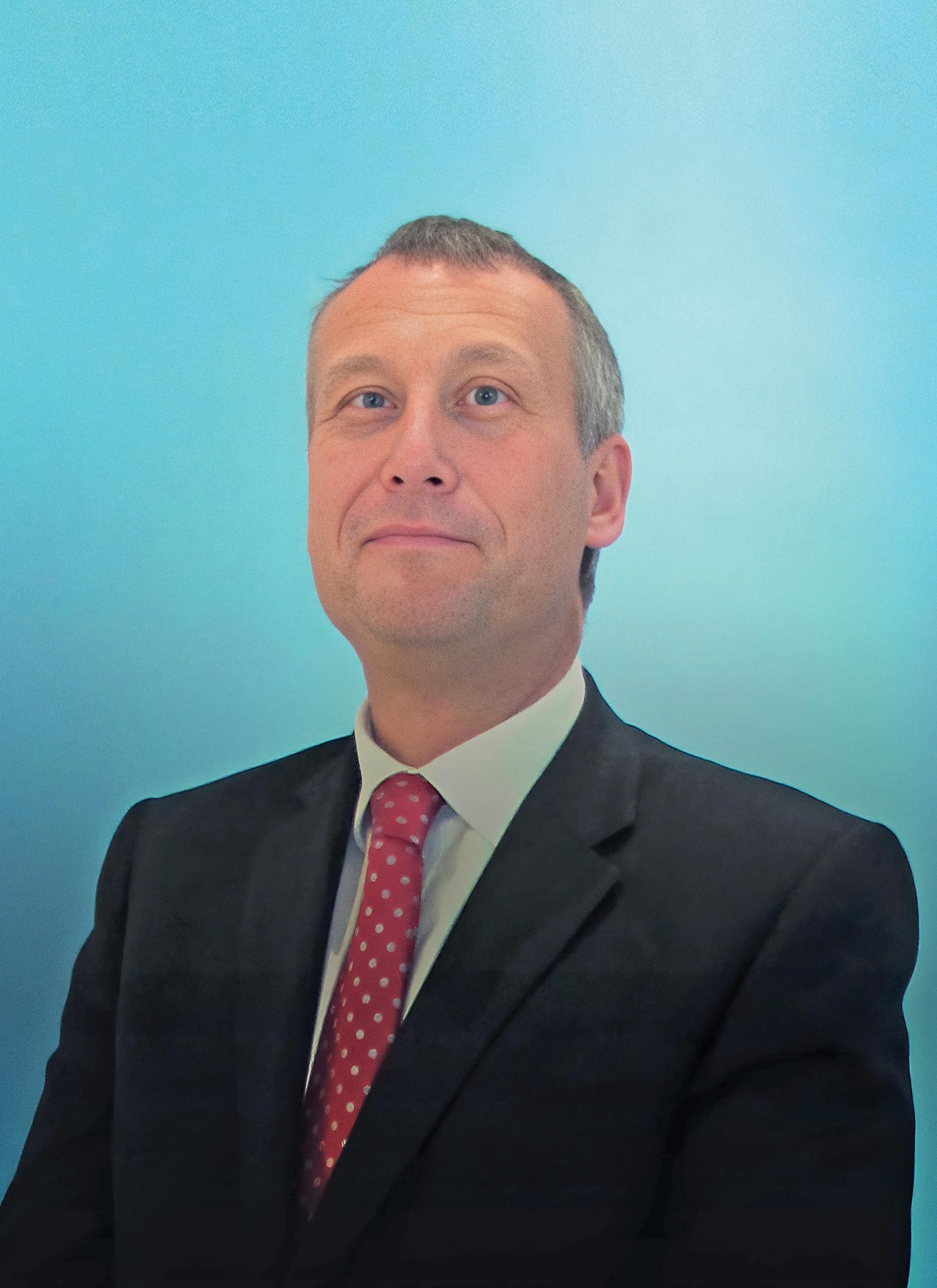
As UK businesses struggle to navigate through rising costs and increasing pressure to reduce their environmental impact, many are often met with conflicting challenges.

Overcoming these challenges requires organisations to focus on small but impactful changes that help them achieve their sustainability targets in measurable stages. We’ve found that tackling blockers in bite-size form can create a snowball effect, helping us implement positive change faster.
We initially identified three key targets for Mitie’s waste on our net zero journey.

These were achieving zero waste to landfill and wherever possible turning waste into resource such as energy, achieving a recycling rate of 80% and securing a waste reduction rate of 25% by 2025. With the targets set, the next thing to do was put a plan in place to make each of them a reality.
When we started to work through how we could achieve our own Plan Zero targets at Mitie, one of the first things we reviewed was the consumables Mitie purchased. Everything purchased to run our offices had the potential to turn into waste at some point, so we wanted to reduce unnecessary items at source wherever possible.
As a business, we identified our most purchased consumables and discovered that black plastic bin liners were in the top three items, with a staggering 40,000 bin liners bought every year, equivalent to 600kg of plastic. It takes 3.6 tonnes of carbon
single-use plastic bin liners with a better solution was high on our list of things to tackle.
Getting rid of bins completely was not an option, so we set out to ban the black bin liner whilst still encouraging people to recycle their waste. In response, we designed an easy-to-empty container called Bin the Bag with three compartments, for mixed recycling, general waste and food waste. Made from 100% recycled plastic, it is easy to clean and requires no chemicals.
Bin the Bag is now trademarked, has been tried and tested at 12 Mitie offices across the country and we’re trialling it with a number of our clients. Feedback so far has been overwhelmingly positive, with users praising the design of the bin and the practicality of including food waste within the product. The savings stack up too; the annual reduction in bin bags saved Mitie £6,000 across our own trial sites, meaning the initiative paid for itself in just two years.
Many people get confused by what can and cannot go into the recycling bin. One way to get a higher recycling rate is to make the process simpler for users with clearly marked bins. Without clear instructions, items are often thrown into the general waste bin, which moves the responsibility from the user and places it onto the business.
Through our work at Mitie Waste, we have discovered three main sources of recycling contamination that frequently end up in all the wrong bins; these items are paper cups, hand towels and food waste.
Getting rid of bins completely was not an option, so we set out to ban the black bin liner whilst still encouraging people to recycle their waste
The materials that make a paper cup can make it difficult to classify as recyclable, simply because they can fall into four different types: polystyrene, waxed line, polyethylene-lined and plant-based. Polystyrene cups are not a wanted recyclable so this falls under general waste.
Polyethylene and waxed can technically be recycled into new paper, but there are only two mills in the UK with the technology capabilities to process this type of product. Plant-based cups can also be recycled at a specific facility, but this solution is not available nationally, making paper cups a general waste item.
Like paper cups, paper towels are technically recyclable given their composition is made up of paper. However, paper towels are deemed unwanted due to being made of a low-grade material at the end of its life. Therefore, they cannot be placed into the recycling bin and fall under the general waste category.
And then we have food waste, which often includes food-related items such as napkins, wooden stirrers or cutlery, sugar sachets and cardboard packaging. Contrary to popular belief, none of these items belong in the food waste bin and are therefore considered contamination.
The recycling process for food waste involves putting waste into an air-free chamber, where bacteria eat their way through the waste creating bi-products used as power in the form of renewable energy, liquid fertiliser and solid fertiliser.
In order for this process to work, only food should be placed into food waste bins as once the waste arrives at the anaerobic digestion facility, the bacteria used in this process can only eat food items. If bins are contaminated, they are disposed of as general waste, meaning we miss the opportunity for food waste recycling.
With all these intricacies unknown to the average bin user, we made sure to clearly label each Bin the Bag section with pictures of what items to put in which compartment to minimise confusion.

There are numerous solutions out there that allow businesses to reduce or eliminate the need for waste and promote the circular economy. I am a big believer in the ‘resource not waste’ philosophy so thinking about how items can be reused is always my go-to.
The WasteMatch portal is a helpful platform for small and large organisations to share, donate, re-use and re-engineer items. It seeks to build stronger community networks by connecting blue chip companies, local authorities, SMEs and charities and find new homes for excess resources, equipment and furniture.
At Mitie we collected and recycled 10,000 bags of old Interserve uniforms, diverting 80 tonnes of material from landfill and saving more than 1,800 tonnes of carbon emissions in the process. The materials will be re-used to make new clothes, insulation and other textile products.
From recycling old uniforms to reallocating unwanted furniture to local charities and materials
to prisons for woodwork classes – there is always a use that can be found for unwanted items.
By looking at ways to prevent waste from being produced in the first place we can avoid the unnecessary consumption of goods and services, and there’s the added bonus of saving money too.
That is why we must keep innovating to produce solutions that can do just that.
A small change in mindset, seeing waste as a resource to be reused, is easier than you think, and very quickly the principles of a circular economy just become business as usual. When we all start to fully adopt the recycling holy trinity of reducing, reusing and recycling we will start making the progress needed to hit those big environmental goals.
I am a big believer in the ‘resource not waste’ philosophy

Taking place on 2 November, the PFM Partnership Awards is set to continue its well-established focus on the benefits of FM collaborations.

As the second issue of FM Director magazine went to press, preparations for the PFM Partnership Awards 2022 were in full swing following the final meeting of the independent judging team in early October.
Last year was the first live presentation of the awards since 2020 and there was an enthusiastic response to the change of itinerary, improved displays and numerous updates, which have been followed this year with an updated image and logo.
Next year will see the event celebrate its 30th year, further emphasising the long-term benefits of its focus on quality and integrity. One of the major elements is the long-established judging process, with the team mostly consisting of clientside FMs.
The PFM Awards adjudication process was established early in its formation and has been adhered to in the decades that followed. Former PFM editor Jane Fenwick, who continued to support the awards up to 2016 – many years after her retirement from full-time work – has been the
main contributor to the event and continues to receive well-deserved praise and recognition from many areas of the FM industry.
The PFM Partnership Awards judging process typically sees teams of two client-side FMs carrying out personal visits to the sites of finalists. Each team is usually allocated two categories, requiring them to make six visits, as each of the Partnership categories will include a shortlist of three finalists.
Each entry is required to include at least two partners, which typically consist of service provider and client and can frequently incorporate several more businesses.
All finalists are asked to identify the location of the site for the judges to travel to, which can be anywhere within the UK. Teams have previously travelled to all areas from the north of Scotland to the Channel Islands and all points in between. The judges give up considerable amounts of their free time to complete the visits, write reports and score the entries, then attend a final meeting to inform the awards team of the winners.
With the Partnership categories representing the majority of the event, there are four awards for
individuals which are also long-established and continue to prove popular. Perhaps the best category to begin with is Team Member of the Year, which was won in 2021 by Silence Tjivella, who was employed by ISS as a cleaning operative at the time.
This category is only available to Partnership entries confirmed as finalists, who are invited to nominate their best non-managerial members of staff, with the intention of providing recognition to those who are often not included in award submissions.
Mr Tjivella was the first to receive his trophy from host and former England rugby international Martin Bayfield, who conducted an on-stage interview. Following his emotional response, during which he stated the importance of recognising cleaning colleagues as key workers, Mr Tjivella received a spontaneous standing ovation.
The second of the PFM Awards individual categories is Young Leader of the Year, which is organised by the Emerging Workplace Leaders (EWL) voluntary organisation and designed to recognise FM personnel who are 35 years old or younger. In addition to providing recognition for young managers and their achievements, the category has also been commended for showing the rich vein of young talent within the FM sector.
Account Director of the Year is another category for individual entries, typically including those with long experience within the FM industry. This also has its own dedicated judging panel of four, all of whom have been involved with the awards for many years.
For the last two years, the final day of judging has taken place at 22 Bishopsgate, London, which has quickly become established as one of the capital’s most notable buildings. During the Coronavirus pandemic last year, Account Director of the Year was the only category within the PFM Partnership Awards to include live judging, as it allowed the judges and finalists to observe social distancing requirements.
The fourth individual award is the Peter Middup Lifetime Achievement in FM category, which is named after another highly influential team member. Mr Middup was the publisher of PFM Magazine for many years and highly popular throughout the FM sector, leading the awards team to name the category in his memory after his early demise after suffering a stroke.
Last year’s winner was Nodulus Solutions founder and director Steve Gladwin who, by happy coincidence, had previously employed last year’s
Account Director of the Year winner Jack Prady, resulting in a number of pictures of them both celebrating their success at last year’s ceremony.
The 2021 version of the awards was perceived as a considerable success, with a favourable response to the change of itinerary – which saw the four individual awards presented before dinner – and an enthusiastic reception for Mr Bayfield’s hosting of the event. This year will see the trophies presented by Radio 2 presenter and international recording artist Aled Jones, who was chosen by the team for the warmth of his personality and complements the considerable efforts of Mr Bayfield last year.
This year’s event will once again be held at The Brewery, Chiswell Street, London, which has long been regarded as the ideal venue for the awards. With a maximum attendance of 600 people, this is considered the ideal size to allow everyone to achieve their aim of networking with the senior attendees present.
The PFM Awards team has extended an invitation to FM Director to attend this year’s ceremony and this will allow the magazine to include a report on the event and the list of winners in our November issue.
Partners in Carbon Savings
Jones FM with Chiswick Park Enjoy-Work
The Leadenhall Building with BGIS and Savills
Wates FM with JLL
Partners in Cleaning
DOC Cleaning with Tower Management Ecoserv with Numatic
Principle Cleaning Services with The Francis Crick Institute
Partners in Cleaning – Large Estates Churchill with the Scottish Police Authority ISS with Santander
JPC by Samsic with British Land Partners in Corporate Anabas with RWE Penguin FM with Easy Bathrooms Portico with NatWest
Partners in Corporate – Finance & Insurance sector Bellrock with LGIM Equans with Experian Mitie with Lloyds
Partners in ESG CBRE with Corps Security
JPC by Samsic with Here East Pareto FM with Mary’s Charity Partners in Expert Services Ascot Services with Mainstay Group
PTSG with Hackney Learning Trust Francis Crick Institute with CBRE
Partners in Expert Services – Public Sector Atalian Servest with Police Scotland Bellrock with London Fire Brigade Sodexo with University of Greenwich
Partners in Healthcare Artic FM with Kings College Hospital Mitie with University College London Vinci Facilities with Propcare Partners in SME Organisations
Artic FM with the British Medical Association
Pareto FM with Flutter
Q3 Services with Chelsea Harbour Partners in Sustainability Cushman & Wakefield with ISS, Andron FM & Park Systems Newcastle
OCS with Eversheds Sutherland
Smart Managed Solutions with Savills
Partners in Sustainability – Public Sector
Landmarc Support Services with DIO and Reds10
Vinci Facilities with the Welsh Government ISS with BEIS
Partners in Technology Application City FM with ASDA PTSG with Tesco
Smart Managed Solutions with Savills Partners in Workplace Redevelopment CBRE with Three DThree with Bumble TSP with Peldon Rose
Account Director of the Year
Tim Hysom, account director, Anabas; Michael Pender, account director, PTSG Water Treatment;
Jerry Haldane, account director, Atalian Servest.
Winners of the Team Member of the Year and Peter Middup Lifetime Achievement in FM categories will be announced on the night
This year’s event will once again be held at The Brewery, Chiswell Street, London
As the concept of the ‘workplace’ has evolved in recent years, PTSG has refitted its Castleford headquarters to create a truly contemporary office space


The office is changing. The whole concept of the ‘workplace’ has evolved rapidly in just a few years. Employers no longer expect their staff to spend 40 hours of every week in the same office –especially if that space is uninspiring.
At the same time, now that workers in all sectors, including construction and FM, have returned to the
office after the pandemic, they expect more from their workspace.
Research has shown that the characteristics of an office can have a serious impact on the behaviour, perceptions and productivity of workers; satisfaction with the work environment has been directly linked to overall job satisfaction too.
Productivity is defined by the ability to get the job
done in the most efficient way possible. Inevitably, employees who are unmotivated or uninspired have an adverse effect business, because they impact the day-to-day running of it.
On the flipside, happy employees are measurably more productive; and a well-designed workspace is proven to contribute positively to this. 2022 sees PTSG celebrating 15 years of trading.




For the Group’s directors, it was the perfect time to unveil a brand-new contemporary workspace at its Castleford headquarters. The pictures and video released by PTSG (available here and on their social media channels) show how the new office, training and relaxation space is equipped and furnished to an extremely high specification. The layout is designed for the Group’s finance team to occupy the upper level, with the downstairs available for all.
Boasting a mixture of glass-fronted offices and open-plan workspace, state-of-the-art dining kitchens and inviting break-out areas – including a pool table –everyone can enjoy a more comfortable and inspiring experience during their working day.

Not only is the entire office light and airy, with plenty of open spaces and partitions made of glass, there is also an abundance of plants. This is no accident. Studies have found we are happiest being close to the outdoors – in fact, nature is vital to our sense of wellbeing. Plants add inspiration to an office and relieve stress. Pot plants also provide oxygen which makes it easier to breathe, so it is well worth the investment. Furthermore, bad or dark lighting can lead to eyestrain, fatigue and even headaches, so natural light is important to help employees feel brighter, more refreshed and less lethargic.
A fact that hardly needs the backing of studies is that boring furniture can also have a negative impact on employees.
A productive office is one that finds the optimum balance of comfort and functionality. That’s what PTSG’s new office has achieved with comfortable and colourful relaxation spaces complementing the clean
lines of the desks, offices and meeting areas. People need to feel free to move around their workspace, and inspiring conversations are proven to happen in welldesigned break-out spaces. That ethos had a strong bearing on the design and layout of PTSG’s new office at Castleford. Its office-based staff are sure to look forward to coming to work instead of counting down the minutes to home time.
The PTSG campus on Whistler Drive in Castleford now covers 15,000 square feet and is one of 47 office and depot locations throughout the UK. As CEO Paul Teasdale said in a recent interview with FM Director magazine, “To be a great company to do business with, it is vitally important that we are a great place to work. It is an overused cliché sometimes, but our people really are our main asset and it is essential that we look after them – creating opportunities for people to develop careers, not just jobs or tasks to undertake.”
A happy and productive workspace, such as the new office at Castleford, also has a positive effect on people’s mental health – and this is something that PTSG holds in high regard. PTSG has a diverse workforce in many respects: age, ethnicity, sexuality and disability, but the majority of its workforce –especially its site engineers – are male. And males are still far less likely to seek health for health issues of all kinds.
The Group’s drive to promote mental health among its people has seen over 20 people become qualified Mental Health First Aid Trainers in the last two-and-a-half years. People now routinely approach PTSG’s Mental Health First Aiders for help.
To be a great company to do business with, it is vitally important that we are a great place to work
This is a real culture change and clear proof that the approach is paying off.
Group HR Director Helen Aukland said: “The link between happy workers and greater productivity is very clear. A positive environment is central to happiness at work and when people feel better, they are far more creative and likely to come up with innovative solutions to challenges and problems. Positive mental health has farreaching benefits for the employee, the team and the business itself.”
PTSG as a business continues to go from strength to strength. 2021 saw the Group make four acquisitions, with a fifth following in January 2022. The acquisitions of HCS and Total Environmental Compliance in June 2021 led to the formation of PTSG’s fifth business division: PTSG Water Treatment Ltd. While PTSG already offered a comprehensive specialist services solution, these new strategically targeted acquisitions cemented the Group’s status as the one-stop provider of specialist services to the construction and FM sectors.
With year-on-year growth forecast to continue, PTSG’s skilled and talented people continue to be central to that success. The new workspace at its Castleford headquarters is an investment in people and PTSG is confident that it will facilitate an overall improved working experience for this large and varied Group.





ne of the more positive responses to the various challenges that emerge in all areas of professional and personal lives is the well-known expression “every cloud has a silver lining”.
This is perhaps even more relevant in the current economic climate that includes high inflation, supply chain uncertainty and record prices for energy. One of the silver linings within these factors is the notably higher levels of awareness of the need to support and assist staff in dealing with the increased cost of living.
With significant numbers of businesses continuing to deal with the impact of the Coronavirus pandemic, one of the more positive developments related to this is that more than 11,000 companies are now accredited as complying with the Real Living Wage. This number has increased by approximately 50% since 2020 and provides firm evidence of improving levels of recognition of the need to support staff members.
Within the FM sector, concern continues to be expressed about the rates of pay for cleaners, security personnel and hospitality, but the efforts
of both clients and service providers are combining to address many of the issues. In many cases, implementation of the Real Living Wage (RLW) will mean challenging some accepted practices, although there is growing evidence to support the view that the benefits far outweigh the cost of higher wages.
This year sees the Living Wage movement celebrating its 21st anniversary since its formation in 2001. With significant growth recorded in recent years, there is growing evidence to support the view that this year represents a coming of age for the RLW movement.

Sebastian Bachelier spoke to FM Director about both the foundation and its Recognised Service Provider (RSP) accreditation, for which he is project manager. The RSP was formed in 2014 with the aim of ensuring that all members agree to submit bids to clients for payment of the RLW and provide annual reports on levels of pay for their staff.
“It’s not always possible for service providers to pay the RLW for various reasons, which is why RSP accredited companies agree to always submit a bid that includes it, then it’s up to the client to decide whether they pay it or not.
“The intention of the accreditation is to help businesses convert to paying the RLW and hope that the annual reports show increases in payment levels year on year. If all service providers were submitting bids that included the RLW, this would eventually change the market and everyone would get the benefit,” he continues.
Mr Bachelier explains that the RSP network consists of approximately 180 members, all of whom are from the private sector and with the majority involved in the provision of cleaning, security and catering services. He further explains that the Living Wage movement first began within the financial sector, with cleaners and security guards most represented within this.
With Citizens UK continuing to oversee all campaigning activities, the Living Wage Foundation was launched to formally accredit organisations for paying all staff members the RLW. There is an additional requirement for Living Wage employers to have a three-year plan to bring all third-party contractors to the same position.
“The idea is that for Living Wage employers, after three years everyone working at your offices or on your sites, or where your company is working will be paid the Real Living Wage,” he continues. Regarding the recent growth in accreditation numbers, Mr Bachelier believes that recognition for key workers during the pandemic has helped to raise awareness of the need to support all staff members.
Mr Bachelier states that within the RSP, CBRE and Corps Security are “really big advocates” and doing “incredibly well” in promoting the RLW and encouraging more companies to increase their wages. Unlike the RLW accreditation, the RSP accreditation only covers a small number of sectors and currently consists of 185 members, which includes the majority of large FM service providers.
There is considerable potential to further extend both the numbers of those signing up to the group and the sectors it covers, which at present mainly focuses on cleaning, security and hospitality. “This is perhaps why the group is not as widely known as the core Living Wage accreditation, which covers all sectors and industries. And while we have a lot of SMEs accredited as Living Wage employers, we’re missing a lot of the SME FM service providers, at present.”
In addition to increasing the numbers of those signing up to the RSP accreditation, Mr Bachelier explains that there is now more focus on helping members to explain the benefits they have enjoyed, with the aim of encouraging higher numbers of clients to engage and support the RLW. Another of the various means used to further develop the RSP is the creation of local Living Wage Action groups around the country.
“The idea is that local prominent organisations will come together and create a three-year action plan that will see the number of people earning the Real Living Wage increase,” he says.
 Sebastian Bachelier
Sebastian Bachelier
The action groups are currently being set up in cities, towns and London boroughs.
“We facilitate but the coordination is led by the groups because they have a strong connection with their local area. It’s mostly Living Wage employers that sit on these groups, but we’re starting to see more Recognised Service Providers join, as well.
“And two of our biggest initiatives are currently making Greater Manchester and Greater London Living Wage regions. They’re both being led by the mayors in partnership with us.”
The target of the London region is to uplift 78,000 people onto the RLW within the next three years. The Greater Manchester group, chaired by mayor Andy Burnham, launched its three-year action plan during the dedicated Living Wage Week last year, with the London group planned for launch during this year’s initiative, which starts on 14 November.
“Service providers feature prominently on these Action Groups and we already have a few sitting on key working strands such as the Hospitality and Service Providers group,” says Mr Bachelier.
In addition to the London launch, there will be a number of official RLW events around the UK, with more details available at Living Wage Week | Living Wage Foundation.
We also spoke to CBRE Global Workplace Solutions (GWS) ESG director Amey Brogan to ask for more details on how her company engages with the RLW RSP accreditation. She began by confirming the growing importance of ESG around the world.

“We are proud to have created a framework that educates and supports our suppliers, customers, and partners. A fundamental part of our strategy focuses on people. We believe that everybody has the right to fair and honest pay, so engaging with the Living Wage Foundation was a natural step in ensuring we, and our customers and partners, understand the importance and significance of paying a Real Living Wage.”
The company’s commitment to the RSP accreditation means it is committed to paying its directly employed staff at the appropriate level, she continues. “Additionally, we are committed to encouraging our customers to pay the Living Wage within their service contracts. It became apparent that this would require more than simply providing an additional quotation within a bid to include an option to pay contracted employees. It required education with a variety of stakeholders.”
To deliver this, the company has utilised its supplier partner programme to provide the necessary education and support framework, targeting a variety of stakeholders.
“With our supplier partners, we collaborate to agree the benefits of paying the Real Living Wage and work with them to engage with the Living Wage Foundation to become a Recognised Service Provider. Working in partnership, CBRE and our supplier partners have held events and engaged with customers in many ways to ensure our people strategy remains continuously and effectively communicated. Since implementing, we have seen increased customer engagement and significantly more contracts that are committing to pay the Living Wage than ever before,” says Ms Brogan.
Corps Security is another well-regarded member of the RSP accreditation and chief executive Mike Bullock tells FM Director that the company was founded with a clear social mission to provide gainful employment to servicemen returning from the Crimean War. “Even then, we committed to being an organisation dedicated to its people. As the company has evolved, we have committed to paying the real Living Wage because it is the right thing to do for our people.
“We need to be able to attract the best talent to the company and pay is fundamental for this. However, it is more complicated commercially, as the competitive bid process revolves around cost. You will not win the business if your offer is not competitive and attractive.
“But this did not deter us; we just had to find a way to make it work. When we joined the Living Wage Foundation we could not be a Living Wage Employer, as most of our employees work on customer contracts, so we became an RSP. By doing so, we have committed to paying 100% of our directly employed colleagues the Living Wage whilst also agreeing to encourage every customer, during a bid process or contract negotiation, to do the same.
“As an RSP, we have been able to further educate our stakeholders about the significance of the Living Wage. We have access to great support from the foundation, which consistently provides facts and data that can help to grow engagement from our customers.
“More significantly, we have been able to engage in events, education programmes, provide speakers and much more with our customers, such as CBRE. They have regularly provided Corps with the opportunity to engage with the wider FM sector and their large customer base.
“This increased engagement and the growth in understanding are having a very positive impact on our business. In September, Corps announced we’re providing over 85% of our 3,000+ colleague base with the real Living Wage, and still rising, and our employee retention remains much higher than the standard for our industry as a result,” says Mr Bullock.
Mike BullockReal Living Wage timeline
2001 Citizens UK launch the Living Wage Movement
2011 Living Wage Foundation formed
2014 Launch of Recognised Service Providers accreditation
2022 More than 11,000 accredited Living Wage employers and 180 Recognised Service Provider group members
More than £2.3bn paid to low wage workers through the scheme
Over 390,000 workers have received a pay rise
As an RSP, we have been able to further educate our stakeholders about the significance of the Living Wage

FM Director will publish an overview of the industry’s latest senior new starters and details of their roles in each of its monthly publications
Global FM service provider Atalian Servest has announced the appointment of three new members to its marketing and communications team to support the company’s long-term strategy and growth plans, enabling its branded businesses to meet the fast-evolving expectations of its customers in the UK and Ireland.
Graham Parsons has been appointed group marketing director UK & Ireland and will be responsible for guiding all marketing and communications functions. He is joined by new head of communications Ian Green and head of brand Brian Bloomer.

Mr Parsons has more than 20 years’ experience of developing and implementing marketing and communication strategies across diverse markets and countries. He joins Atalian Servest from Mitie where he was head of marketing and technical services.

Food services provider Compass Group has announced the promotion of Gaétan de L’Hermite to its group executive committee following his appointment as regional managing director for Asia Pacific (APAC).

Since joining the company in 2002, he has held various managing director roles in Africa, Central Asia, Ireland and, most recently, France, where he successfully led key projects including the full sectorisation of the business, the creation of new operating brands and the recent launch of Compass Group France’s comprehensive Net Zero 2040 roadmap.
Mr de L’Hermite is now responsible for the group’s business interests across APAC, its third largest region, which includes Australia, Japan, New Zealand, China, and India.
Hard service provider Platinum Facilities has announced that Paul Goodchild has been promoted to managing director.
He joined as finance and commercial director in 2018 and earned his promotion through his extensive efforts to enable exceptional service delivery, develop the company culture and achieve growth.
Mr Goodchild has 23 years’ experience in the service industry, 14 of which are in the FM sector. He is a qualified chartered director with the IOD, has an MBA from Robert Gordon University and is CIMA Professional Qualified.
David Kos has joined the Colliers National Capital Markets team as a director of industrial and logistics investment, bringing with him a wealth of knowledge and contacts across the sector.
Mr Kos previously worked for niche investment agency Lewis Ellis and was made a partner in the business last year. He has significant transactional experience across all commercial markets and in recent years had a strong focus on industrial and logistics as the sector gained momentum.

He will be responsible for enhancing his new employer’s presence in the industrial investment markets at a national level, while working closely with its agency team to provide a full service to developer and investor clients.
Peter Grierson has joined Birmingham-based mechanical and electrical building services provider J S Wright as its new managing director.

He was previously national sales director for Wolseley Pipe and Climate and will take control of the day-to-day running of his employer and its sister company Wright Maintenance following Phil Leech’s move to chairman.
He is based at the Aston headquarters of the employee ownership trust-controlled company, which also has a London office. Mr Grierson has more than 30 years of experience in the sale of building products to the construction industry.
CPW has confirmed the re-structuring of its East Midlands offices with the addition of four wellknown industry professionals to lead the way.
Its Nottingham, Leicester, and Derby offices will see new leadership. Directors Carl Humpage and Carl Hubbard will run Nottingham, while director John Hauton takes the helm at the Leicester office. Craig Waldron, also a director, will continue to run Derby and support Nottingham.
Mr Humpage said: “We have been through a series of changes recently across CPW East Midlands. This change has helped us prepare for the future with a long-term strategic plan. This new plan is based on a healthy workload, and we have secured a number of new opportunities with existing and new clients in the region.”
Tracy Burtwell has been appointed as the new managing director of phs Compliance.
Based in Warrington, phs Compliance is one of the UK’s leading providers of FM and compliance services.
Former managing director Dan Lee has been promoted within the group to the position of group managing director, responsible for overseeing all phs specialist divisions.
Ms Burtwell joins phs Compliance with over 12 years’ experience in the service industry and a reputation for transforming businesses and securing long-term growth.

The Net Zero Carbon Buildings Standard initiative has appointed Related Argent chairman David Partridge as chair of its recently convened Governance Board.

Mr Partridge will oversee the development, implementation and ongoing maintenance of the Net Zero Carbon Buildings Standard.
He brings a wealth of sustainability knowledge and leadership to the initiative and was formerly appointed chairman of UKGBC, immediate past president of the British Property Federation and sits on the Construct Zero Advisory Board of the CLC.
Hard service provider Cloudfm has confirmed the appointment of Katrina Christopoulos as head of ESG.
She will drive the environmental and social policies of the company, working with customers and suppliers to accelerate change. Her previous roles include leading sustainability at Bloomberg in its London headquarters.

Ms Christopoulos is an associate of the Institute of Environmental Management & Assessment (IEMA) and a chartered energy engineer.
Ms Christopoulos said: “Cloudfm is recognised as a leader in carbon reduction in the FM and wider built environment sectors. I can see that this company wants to cut through the greenwash and go beyond their own business, to really make tangible progress across ESG.”
Sodexo has appointed former British Army senior officer, James Illingworth OBE, as advisor to its government board to strengthen its relationships across Whitehall, the armed forces and the charity sector.

With over 35 years of strategic military experience, he brings strong corporate leadership and people management skills as well as an acumen for business development.
Mr Illingworth’s last British Army post saw him serve as director of land warfare with responsibility for leading, organising and managing the delivery of training across the UK and determining the army’s future training transformation.
Dedicated recruitment service launched to assist FM businesses to attract the best talent and support all aspects of their growth ambitions

One of the biggest challenges for the FM sector has been to reduce attrition rates within workforces and recruit new members of staff to allow businesses to take on more work and achieve their expansion targets.
The launch of the FM Recruiter service this month has been designed to provide essential support and high quality job candidates for all areas of our extensive industry. With the dedicated website now live, fmrecruiter.com can be accessed by both employers seeking new staff members and those looking for new work opportunities.

This service will be further supported by extensive coverage in all areas of FM Business Daily, which currently consists of FM Director magazine, fmdirector.com and fmbusinessdaily.com websites, daily newsletters and marketing services. With a database of 220,000 industry contacts, this is being used to both promote the FM Recruiter service to senior FM personnel.
Over the past few months FM Recruiter has been collaborating with well-known agencies and recruiters in the FM sector to create a product that directly addresses their needs, the site has been rigorously tested and invaluable feedback has been integrated into its development. Similar to other aspects of the FM Business Daily brand FM Recruiter is now able to provide an invaluable service that offers real advantages to FM businesses, by helping to find the talent they need to prosper.
Individuals looking for new work opportunities can register and upload their latest CVs, which will then allow them to apply for any jobs of interest. They are additionally able to create job alerts and receive notifications as soon as vacancies of interest are posted by employers. Job seekers can also choose to allow recruiters to match their skills to vacancies, including vacancies that are not directly advertised on the job board.
Those providing recruitment services are also able to register on the FM Recruiter portal. Larger recruiters and agencies are encouraged to contact the FM Recruiter team in order to agree bespoke packages tailored to meet all their specific needs.
Although the FM Recruiter service is new to the industry, it has been formulated on the highly successful outlines provided by the RBD Rail Recruiter service, which launched earlier this year. The rail sector exclusive job board now works with many of the biggest and best known recruiters in the industry.
The FM Recruiter service will include employment
cover all areas of the wide-ranging FM sector. This will include vacancies posted for everything from operations management to cleaning, fire and security to catering, engineering and maintenance to concierge and reception. Job opportunities will also be posted for those in business development, finance, HR and administration, further emphasising the dynamic nature of the industry. Further information is available from FM Recruiter managing director Dean Bruce (dean@fmrecruiter.com)
FM Recruiter has been collaborating with well-known agencies and recruiters in the FM sector to create a product that directly addresses their needs



The introduction of the new Fire Safety Regulations will require effective action to meet the requirements and ensure building occupants remain safe, says PTSG Fire Solutions
Effective preparation is the key to complying with all aspects of legislation that applies to facilities and Premier Technical Services Group (PTSG) has many years of expertise in this area to support clients on the journey to prepare for and meet these, with the new Fire Safety regulations providing the most recent case in point.
The government has introduced the recent updates under article 24 of the Regulatory Reform (Fire Safety) Order 2005 (Fire Safety Order), which incorporate the majority of recommendations made by the Grenfell Tower Inquiry Phase 1 report and these will become law in January 2023. Experts from PTSG Fire Solutions are available to assist with all guidance and queries relating to the new laws.
FMs and service providers need to appreciate that the Fire Safety Order applies to all premises, including workplaces and the common parts of all multioccupied residential buildings, for example, and PTSG finds that a growing number of enquiries for its services are resulting from the new regulations.
Further information on all aspects of the Fire Safety regulations is available on the www.gov.uk website and from the experts at PTSG Fire Safety, who can provide guidance for FMs and service providers to allow preparations to be implemented prior to the various requirements becoming legallyrequired actions.
One of the requirements is for responsible persons managing high-rise blocks of flats is to provide
information to Fire and Rescue Services to assist them to plan and, if needed, provide an effective operational response. Additional safety measures will also need to be provided in residential buildings with multiple occupants and buildings of 11m or more in height.
These will need to be appreciated by FMs and service providers tasked with the management of relevant facilities, which may include mixed-use developments.
All residents will need to be supplied with fire safety instructions and information on the importance of fire doors and all aspects of the new legislation can be explained by the experts within PTSG Fire Solutions.

In high-rise buildings, responsible persons will be required to demonstrate the completion of:
Building Plans: providing local Fire and Rescue Service with up-to-date electronic building floor plans with a hard copy of plans, alongside a single page building plan which identifies key firefighting equipment stored in a secure information box on site.
External Wall Systems: provide local Fire and Rescue Service information about the design and materials of a high-rise building’s external wall system and inform the Fire and Rescue Service of any material changes. Also providing information on the level of risk that the design and materials of the external wall structure includes and mitigating steps taken.
Lifts and other Key Fire-Fighting Equipment: undertake monthly checks on the operation of lifts intended for use by firefighters and evacuation lifts and check the functionality of other key pieces of firefighting equipment. Any defective lifts or equipment should be reported to local Fire and Rescue Services and, if the fault cannot be fixed within 24 hours, to record the outcome and make details available to residents.
Information Boxes: install and maintain a secure information box in the building, including contact details of the responsible person and hard copies of the building floor plans. Wayfinding Signage: installation of signage visible in low light or smoky conditions that identify flat and floor numbers in the stairwells of relevant buildings.
It should be noted that the changes in legislation have resulted from inquiry into the Grenfell Tower tragedy, launched by the government in August 2017. The Inquiry published its first Phase report in October 2019, with the majority of recommendations accepted by the government.
The Home Office launched the Fire Safety Consultation in 2020 and Section 2 of the Fire Safety Consultation outlined the intention to lay regulations under article 24 of the Fire Safety Order. The Consultation also included proposals to implement the recommendations in a practical way.
The Fire Safety Act 2021 clarifies that the Fire Safety Order applies to a building’s structure, external walls and any common parts of premises including all flat entrance doors for buildings containing two or more sets of domestic premises. The regulations sit alongside the Building Safety Act amendments to the Fire Safety Order, with all actions intended to improve fire safety outcomes and to protect the public from the risk of fire by better supporting compliance and effective enforcement in all regulated premises.
Whilst responsible persons are encouraged to work towards compliance, they have been requested not to begin submitting electronic information to local Fire and Rescue Services until closer to the date of commencement.
The Inquiry recommendations referred mostly to high-rise buildings of 18m or seven storeys in height. This measure has been commonly used to define a high-rise building in England and complement Building Standards legislation, for example, which becomes more restrictive at this height and include different fire-fighting tactics.
Limiting those parts of the regulations which require responsible persons to share information about their building electronically to Fire and Rescue Services ensures that the correction information is available to assist them deal more effectively with the most complex fires.
The government has completed a full impact assessment, which states that any costs that arise from these regulations should result from the new activity to improve a building’s overall fire safety and from purchasing new items, including an information box or signage for the building.
PTSG Fire Solutions further explains that the information above is not exhaustive and there are more details and implications that need to be appreciated and considered to ensure that each facility complies with all aspects of the new legislation where relevant.
The company is able to provide advice and guidance for all areas of the new legislation to ensure the safety of occupants, while also helping to protect responsible persons against the potential negative outcomes in the event of a fire occurring in their facility.
FMs and service providers requiring more information or guidance on the new regulations are invited to contact PTSG Fire Solutions, especially for the services listed below.

should be noted that the changes in legislation have resulted from the inquiry into the Grenfell Tower tragedy, launched by the government in August 2017
360 Sport Finance and Mentoring is dedicated to helping professional and semi-professional sporting clubs and venues with sustainable financial growth, including non-event day business. help@360accountants.co.uk www.360accountants.co.uk 01482 427360

A service provider for the future, Advance Facilities Solutions Ltd delivers complete building solutions to customers in the industrial, commercial, and domestic sectors. helpdesk@advance.fm www.advance.fm 01622 720 888

Specialist contractor Composites Construction UK operates throughout the UK and Europe. Using innovative methods, we carry out structural strengthening and repairs to concrete, timber, and masonry structures. contact@fibrwrap-ccuk.com www.fibrwrap-ccuk.com 01482 425250

When it comes to pest control in London, Dyno-Pest understands how to handle your problems. We offer a simple solution, using the latest methods to deal with pests effectively and responsibly. info@dynopest.co.uk www.dynopest.co.uk 0800 802 1246

FASET is the established trade association and training body for the safety netting and temporary safety systems industry. We support members with guidance, training, and exclusive benefit schemes. enquiries@faset.org.uk www.faset.org.uk 01948 780652

GIND UK delivers ambitious projects in challenging environments. Our London-based engineering and design team specialises in bespoke access system maintenance for the world’s most iconic buildings. info@gind.uk www.gind.uk 0800 448 8884

Integral Cradles Ltd. delivers permanent façade access solutions across the UK, specialising in high buildings with unique specifications and demands. A whole life-cycle solution. kevin@i-cradles.com www.i-cradles.com 0845 074 2758
For almost 30 years Julius Rutherfoord has been passionate about providing professional cleaning services to some of the most prestigious organisations in the London area. info@juliusrutherfoord.co.uk https://www.juliusrutherfoord.co.uk/ 020 7819 6700

Keytracker Ltd is the most prominent provider of both mechanical and electronic key and equipment control systems for the workplace. sales@keytracker.com https://www.keytracker.com/ +44 (0)121 559 9000

Established over 70 years ago, KCS has rapidly grown from its roots as a respected local window cleaning business, to a nationwide commercial cleaning company. info@kingstoncleaningservices.co.uk www.kingstoncleaningservices.co.uk 01482 648 737

Launched in 2008 following the merger of two 50-year-old companies, Magicccote provides a range of expert commercial cleaning solutions to customers across the UK. info@magiccoteuk.com www.magiccoteuk.co.uk 01482 211033

neutral carbon zone (NCZ) is a full-service platform that gives you the tools your company needs to make the transition to a carbon neutral business and beyond. gozero@neutralcarbonzone.com www.neutralcarbonzone.com 0845 094 5976

Pace Security is a London-based privately owned company managed by some of the UK security industries’ most experienced and respected security industry professionals. Lindsay@pacesecurity.co.uk https://pacesecurity.co.uk/ 0208 529 3888
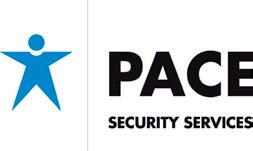
Penguin FM (part of the Dhand Capital Group) is a total facilities management and fit-out company, based in Leeds, West Yorkshire and operating nationwide, to ensure that client properties remain safe, compliant and efficient. info@penguinfm.co.uk https://penguinfm.co.uk/ 0113 815 6111


Premier Technical Services Group Ltd (PTSG) is the UK’s leading provider of specialist services to the construction and facilities management sectors. info@ptsg.co.uk https://www.ptsg.co.uk/ +44 (0) 1977 668 771

PPSPower (PPS) is one of the industry’s largest and most respected providers of generator and UPS (uninterruptible power supplies) installation, maintenance and repair solutions. sales@ppspower.com https://www.ppspower.com/ 0345 200 9888
SAEMA has a long history in delivering the best training and guidance in the temporary and permanent suspended access industry. We are committed to advancing safety through raising the standards in best practice. info@saema.org https://www.saema.org/ 01948 838616
Safe Electric is an NICEIC-approved Electrical Contractor, serving Peterborough, Milton Keynes, and Cambridge. With 48 years of industry experience, our electricians and compliance experts can undertake any project. sales@safe-electric.com https://www.safe-electric.com/ 01487 813 600



At Safety Inspection Solutions Ltd (SIS Ltd) we’ve been helping companies to stay legal for over ten years. Our qualified engineers provide fair, efficient, and flexible onsite inspection services, working closely with clients to understand their needs. enquiries@sis-ltd.org.uk https://sis-ltd.org.uk/ 0800 6696 018

Seddon Management Services strives to offer the best solutions for trade associations to keep their members safe and compliant. becky@managementandauditing.co.uk www.seddonmanagementservices.co.uk 07854 226251
SLM can provide all types of waste management tailored to meet the customers’ requirements. We deal in all types of recycling; electrical, hazardous, clinical. Anything you need disposing of, SLM can help. lucy@slm-waste.com https://slm-waste.com/ 01304 775000








